Photo
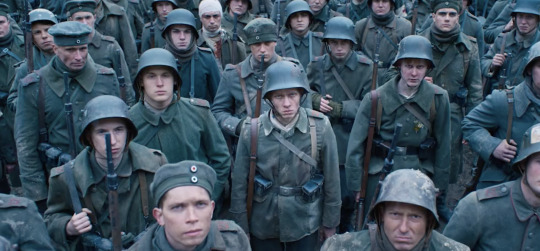
When your dream becomes your nightmare
(Review of ‘Im Westen nichts Neues’ watched on the 31st of January 2023)
‘Im Westen nichts Neues’ or ‘All Quiet on the Western Front’ as it is known as in non-German areas has been sneaking up on the ongoing awards season. From being a player in the International Film category to then starting to pop up in the technical categories, and now, ultimately, it has ended up as being one of the biggest players of the season with 14 BAFTA nominations and 9 Oscar nominations. An impressive trajectory for the German film, which of course is based on the famous book that previously led to 2 Oscar wins from 4 nominations for Lewis Milestone’s 1930 version of the book. This time, as stated, it is a German production, which tells the gripping story of young Paul and his friends in the last year’s of WWI, and director Edward Berger has created one of the most heavy-hitting war films of recent years.
In the beginning we meet 17-year old Paul Bäumer along with his friends as they prepare to enroll themselves in the German army in 1917. Paul has not received his parents’ written consent, but a forged signature later and he’s ready to join the pride of the nation as they prepare for the final weeks of war before finally marching into Paris as national heroes and winners of the war. At least that is the story, that the boys have been fed and the dream they all have as they are hyped for the adventure that awaits them along with thousands of other young souls. Little do they know about the true nature of what awaits them on the western front, and as such these scenes of young pride and excitement are equally devastating and infuriating to observe. What follows is a story with two focus points: the story of Paul and his friends participating in the truly horrific battles of the frontline and a political story in a luxurious train wagon far away from bullets and grenades as officials from France and Germany negotiate the ceasefire and ultimate surrender of Germany finally agreed upon on the 11th of November 1918.
With the film coming out just a few years after Sam Mendes brought our attention to WWI with his suspenseful ‘1917’ comparisons between the two of them are obvious to make. Especially as both stories try to tell the story of the actual (in both cases very young) men taking part in the devastating battles caught in a game that they have no control of. However, the way they decide to tell their stories are substantially different. While Mendes’ film succeeded as a suspense thriller thanks to its groundbreaking cinematography and a classic heroic tale, Berger’s re-telling of All Quiet has no interest in painting any heroic story. Of course, it’s always the winner, who gets to tell the stories and as such it is also hard to imagine a heroic take on a young German soldier would go down well today. But the facts that Paul is never portrayed as a hero and that Berger allows him to make despicable choices on the battlefield, makes the film’s anti-war story so much stronger, when we still end up hoping for Paul’s survival. He is neither an evil person nor a flawless hero; more than anything he is a confused, deluded young man caught in a dream that quickly shows itself as his worst nightmare. Caught between becoming the man his surroundings demand him to be in order to survive and defending his central human values, Paul becomes a symbol of the millions of young men from all countries who joined the war (and any other war for that matter) on false pretences only to have their lives altered forever.
Made clear by the themes discussed above, Paul is a very complex character, and the work that Felix Kammerer does with this character is nothing short of spectacular. It seems impossible to believe that this marks his first feature film role. With a slender physical presence, he carries the film on his shoulders as he confidently navigates his way through physically demanding battle scenes, emotionally nuanced moments of reflection and haunting encounters throughout. One scene in particular involving Paul and a French soldier in a crater on the battlefield highlights the film’s biggest strength in my opinion: showing the brief moments of humanity in the bleakest of moments. The moment where Paul realise the nature of what’s going on, is Kemmerer’s finest acting in the film as he within seconds switches from a horrifyingly primitive state of mind to heartbreaking clear-sightedness. In addition to Kammerer, all the actors portraying Paul’s friends and company deliver fine work, but it is well-deserved that Albrecht Schuch as Stanislaus Katczinsky (or simply Kat) has received the biggest attention as he too manages to balance the nuances of their characters perfectly. It would have been so easy to fall into the trap of either making these characters completely unlikeable because of the sheer horror of their actions or awkwardly heroic completely ignoring said actions. It deserves recognition that the film’s main cast manages to balance this complexity as well as they do.
This, of course, also hints at great directing by Edward Berger who has made many clever choices with his film. He does, however, also make some questionable choices. For instance, I get the reason behind showing the ongoing “peace” negotiations along with the war horrors. It clearly serves a purpose by highlighting the absurd nature of the war where young, unsuspecting men play the parts of pawns in a deadly game of chess controlled by the generals, marshals and politicians operating in luxury far away from danger. However, these scenes never feel as fulfilling or interesting as the rest of the film. They feel like a slightly different film and I think it would have worked better if Berger had found a different way of portraying this contrast of the war. It could have been by showing us parts of the reasons why Paul and his friends were led to believe that they were joining the army to become heroes. What stories were they told, how were they told and by who? That could have served the same purpose while keeping our focus on Paul’s arc.
While this perhaps hints at some issues with the film’s screenplay and Berger’s realisation of this, his realisation of his technical visions leaves nothing to be desired. He has created what feels like the bleakest and most harrowing depiction of war in recent years thanks to stunning cinematography, effective VFX and makeup and a fresh, haunting score. First of all, the cinematography is stunning: you feel the chaotic and claustrophobic horrors of the battles through great action filming, but we are also treated to some stunning night scenes, where I couldn’t help but feel that James Friend had been inspired by Roger Deakins’ work on ‘1917’. The VFX are supporting and often invisible, but they help make the battles scenes feel realistically scary as explosions occur and gun wounds appear naturally. These things of course also gives a lot of work to the make-up department, which have created numerous wounds and injuries through prosthetics, but it is perhaps the make-up that shows the battlefield’s marks on Paul that is the most impressive with Kammerer’s face often hidden behind layers of mud, ashes and blood. Finally, Volker Bertelmann’s score feels fresh and new for a war movie. I first listened to it before watching the film and it reminded me more of a sci-fi score, but it worked really well and it’s ominous and surprising use of sounds helped me get invested in the story. A really cool score!
All in all, the many praises that ‘All Quiet on the Western Front’ has received are well-deserved as Edward Berger and his team has managed to create a devastating, haunting and (sadly) highly relevant depiction of war and the many horrors it inflicts on the people who are often closest to the dangers and consequences of it and furthest away from having any meaningful influence on its outcome. As such Berger’s retelling of the 1929 novel is every bit as relevant today as it was when Erich Maria Remarque wrote it based on his own experiences in WWI. We still struggle with war, and on a daily basis we are shown how the decisions of the most powerful inflicts irreparable consequences for the lives of their own people. And as such the ambiguity of the German title “Im Westen nichts Neues” is extremely fitting. Much like the soldiers in the film, Berger’s film is not without flaws, though. However, it surely will find its place among other big films that try to warn us about the human consequences of the constant desire for more power, more victories and more national glory. Because sadly, nothing’s new on that front.
4/5
#Oscars 2023#95th Oscars#Academy Awards#Film Review#Movie Review#Oscar nominee#All Quiet on the Western Front#Im Westen nichts Neues#Edward Berger#Felix Kammerer#Albrecht Schuch#Best Picture
7 notes
·
View notes
Photo

Does niceness last when meaninglessness hits?
(Review of ‘The Banshees of Inisherin’ watched on the 26th of January 2023)
When Martin McDonagh releases a new film, I am instantly intrigued being a big fan of ‘In Bruges’ and his latest film ‘Three Billboards Outside Ebbing, Missouri’, which saw him receive more mainstream recognition with 2 Oscar wins and 7 nominations to top it off. Thus, it was with huge expectations, I went to the premiere of his latest film, ‘The Banshees of Inisherin’, which not only sees him reunited with ‘In Bruges’ stars Colin Farrell and Brendan Gleeson, but also has secured him even more recognition and attention with no less than 9 Oscar nominations, including the elusive Best Directing nod, that he was snubbed for with ‘Three Billboards’. Banshees is more like ‘In Bruges’, but mostly it is completely its own bringing a fresh, thought-provoking and highly entertaining mix of pitch-black, dry Irish humour and existential dread in the midst of both national and personal crises to the table.
The story takes place on Inisherin, a small fictional island that overlooks the Irish mainland on which the civil war is raging with blasts and smoke clouds being a constant reminder of the ongoing battles. Here we meet Pádraic who is on his way to his friend Colm’s house to invite him to their daily afternoon beer at the pub. However, this day something is odd. Colm doesn’t want to go and as a matter of fact, he doesn’t even want to interact with Pádraic who is left in disbelief. Everything was okay yesterday, wasn’t it? What happened to cause this change of heart or could it be, that Colm - even worse - all of a sudden just stopped liking Pádraic? As Pádraic desperately tries to understand the situation, Colm grows increasingly annoyed until the day where everything takes a dramatic turn and Colm threatens to cut off a finger every time Pádraic disturbs him. This throws the confused Pádraic into the arms of Dominic, who is not only the son of the island’s police chief but also deemed the “village idiot”. What is Pádraic to do? Should he seek solace at home with his sister Siobhán and their animals, who never lets him down? Should he follow the often alcohol-fulled roads of Dominic? Or should he try to convince Colm to come to his senses despite the risks of ignoring his threat?
Pádraic is in his core a very simple man, yet in the hands of Colin Farrell his complex character is unfolded beautifully. From his initial confusion to his growing frustration and simultaneous deroute, Farrell embodies all of Pádraic’s emotions, while also producing laugh after laugh in his often witty interactions with Jonjo the pub owner and Jenny, his miniature donkey and - perhaps - closest and dearest friend. Ultimately, Pádraic ends up as an interesting character study. There are clear signs of depression in his traits, and it is in his meeting with the meaninglessness of his world (and existence) that Farrell takes his acting to a new level in my opinion. His mannerisms and voice work hides a depth in his character that suits McDonagh’s often razor sharp dialogues perfectly. As in ‘In Bruges’ Farrell plays opposite Brendan Gleeson, who - in the role of Colm - is much more reserved and mysterious. He first of all excels in being the blunt of the two friends and the scenes in which he confronts Pádraic are terrific. Colm is a talented violin player and he is doubting his existence; he feels a need to achieve something in life before it is too late. It is in Colm’s despair that Gleeson finds his biggest playing field and makes us reflect the most; because how long will niceness last when the world shows us its chaos and the fact that we all have an expiration date? When is it time to be egoistic? And can you really just end a friendship from one day to another? While Gleeson is perhaps the least showy of the film’s four big acting performances, he and McDonagh creates an interesting character in Colm.
Farrell and Gleeson deliver some of their finest work ever, but it is - in my opinion at least - actually the supporting cast that are the true stars here! Barry Keoghan, while balancing on the fine line of overacting, steals every scene he has as the equally annoying and endearing Dominic. On the surface, he is the “village idiot”, the black sheep of the island, but he not only holds tragic secrets but also surprising insights slowly revealed the more we get to know him. With Dominic, Martin McDonagh once again shows a talent of creating surprisingly likeable and nuanced characters who on the surface level and often in their behaviour is everything but likeable. One of the best scenes of the film is between Dominic and Pádraic’s sister Siobhán at a lake. Dominic does and says things that makes it hard to like him, but thanks to Keoghan’s acting both we and Siobhán cannot help but also show some care for him. A scene which also highlights the perhaps strongest performance in the film: that of Kerry Condon as Siobhán. Caught in between protecting her brother and wanting to escape the fecking dull prison that is the island, Siobhán is both strong-willed and caring. Condon, much like Keoghan, steals every scene she has, and manages to not only show compassion for her brother but also speak the truth without holding back. A true breakthrough performance! Finally, I feel the need to highlight Pat Shortt as Jonjo the pub owner; his line delivery in the almost lyrical dialogues had me laughing plenty of times, and Sheila Flitton as the mysterious Mrs. McCormick constantly present in the outskirts of the storyline as an ominous presence.
While the acting plays a huge part in why this film is such a brilliant viewing, it wouldn’t be a McDonagh film without his characteristic and sharp writing. With Banshees he manages to tell a story without much going on and certainly without any major, sudden changes in suspense. Yet, it flows perfectly and I couldn’t wait for each new scene. While I can totally understand why some people will be looking for the more classic narrative composition, the slow moving storyline worked perfectly for me. The interesting thing here isn’t why Colm all of a sudden doesn’t want to be friends with Pádraic; it is to see how they both react to this meaningless change of events with one forcing himself to focus inwards and the other slowly being forced to it by the actions of his previous friend. It is too see how difficult it is to break out of patterns in an enclosed society. And to realise how the world seems to be slowly ignoring everything that used to be sacred. Additionally, only a few writers manage to write such witty dialogue as McDonagh does here; the exchange of lines flows like a perfectly composed melody often spiced with his signature dark humour.
On top of a great script, McDonagh has put together a team that simply makes the film an utter delight to watch and listen to. Ben Davis’ cinematography is beautiful and contributes some great views of the island, and especially a series of atmospheric montages were visual highlights for me. Mikkel E. G. Nielsen - fresh off an Oscar win for his editing of Sound of Metal - edits the film flawlessly and plays a huge part in the great flow of the film and the melodic nature of the dialogue. Not even close to being the most showy editing, but that just goes to highlight that his more invisible editing is just as important in creating good, cinematic experiences. Finally, Carter Burwell delivers another moody and atmospheric score for McDonagh. A score that never takes center stage, but helps highlight the sombre, reflective atmosphere of the story.
McDonagh brings (for him) typical topics to the table: the nature of friendship, the study of violence causing violence, and the recognition of outsiders. But he also draws clear parallels to the civil war simultaneously raging on the mainland and how wars and conflicts, which we often struggle to find meaningful, can change our relationships and conditions of life from one instant to another. I also could not help but feel Colm’s often excessive need to be dramatic and (perhaps unfairly) blunt towards Pádraic as a comment to the current climate of societal discussion. All in all, ‘The Banshees of Inisherin’ is McDonagh bringing his best as a writer and a director, a feast of wonderful actors giving it their best and a delightfully crafted treat of slow-paced comedic drama. Right up my fecking alley!
4,5/5
#Oscars 2023#95th Oscars#Academy Awards#Film Review#Movie Review#The Banshees of Inisherin#Martin McDonagh#Colin Farrell#Brendan Gleeson#Barry Keoghan#Kerry Condon#Best Picture
4 notes
·
View notes
Photo

A lacklustre and frustration visual feast
(Review of ‘Avatar: The Way of Water’ watched on the 15th of January 2023)
When James Cameron had his grand return (apart from documentaries) to cinema in 2009 with ‘Avatar’, it was not just a moment of cinematic history breaking records and causing a major following; it was also a milestone in filmmaking as he fully introduced 3D into mainstream cinemas and presented mind-blowing developments in CGI and its possibilities. I, however, never jumped on the Avatar train and I was deeply disappointed by the original when I finally got to see it in 2018 at home. Not seeing it in the cinema upon its release and, thus, not being part of this groundbreaking moment of cinema, is one my big film regrets. Could my experience have been substantially different, had I seen it in the cinema? Who knows, but one thing was certain: I was not going to sleep on the long-awaited sequel, ‘Avatar: The Way of Water’ - I had to see it in the cinema. Did it give me a more positive experience? Yes and no, but ultimately - as hinted at in the headline - I was left frustrated by Cameron’s already record-breaking new addition to the adventures on Pandora.
The story is very simple, although it demands some kind of knowledge of the first instalment, even though Cameron tries to take our hands in the beginning as the characters and locations are re-introduced. Once again, we follow former marine Jake Sully, who gave up his human life to turn fully Na’vi in the first film. He is now the leader of the tribe together with his wife Neytiri and their four children, of whom one (teenager Kiri) is adopted after a strange birth given by Dr. Grace from the first film. They all live peacefully and in harmony with a group of human scientists, when the evil “sky people” all of a sudden return in the shape of a team of super soldiers turned full time Na’vi with a reborn clone of Quaritch as their leader. He seeks one thing: revenge over Jake and his family, but will he succeed? And what about human boy Spider, who lives with the Na’vi, but doesn’t know his father?
As stated this is a very simple story, and to put it nicely, this storyline is nowhere near strong enough to be able to carry or justify the film’s monstrous 192 minute running time. And this is the first reason why I was left frustrated rather than satisfied by The Way of Water. The first hour - or so it felt like - is mainly re-introducing us to the characters and the locations as well as establishing the revenge plot and subsequent plot of Jake Sully deciding to leave the forrest, to leave “his” people to protect his family. This sees the family of six flee to the Metkayina reef area and their clan. In the next hour, which is undoubtedly the most interesting and fascinating, we get a decent story equally about a family finding themselves to be in a different and vulnerable situation and a clash of cultures. This exploration of a brand new culture on Pandora is not only fascinating but is also - by far - the most immersive, imaginative, relevant and visually pleasing aspect of the film, but - alas - the action quickly returns as we enter the final hour and final battle, which is neither imaginative nor emotionally rewarding. At least not to the extent that the preceding hour both demands and deserves. Hence, why the story frustrated me. Basically, I sighed every time we cut away from Metkayina to follow the simultaneous storyline of Spider and the villains. A huge issue as I never got invested in them, their cause or their characters; for this to have taken place, Cameron simply draws them way too one-sided and one-dimensional. Even worse, the same can - to some extent - be said about the “good guys” too. I sorely miss some nuances, subtlety and surprises.
Actually, I had the feeling I was watching a poorly written 80’s action flick through the most lavish, awe-inspiring glasses. There is no doubt, that this is a deeply personal prestige project for Cameron, but I wish someone would have demanded more focus on the screenplay during the film’s many years of production. Not only is the story lacklustre and the characters paper thin, the dialogue is also often uninspired. Just a couple of examples of dialogue: “Why so blue?”, “I can’t believe, I’m tied up again”, “Sometimes it's not so great to know who your father was” and “Remember kid, a marine can't be defeated. Oh, you can kill us but we'll just regroup in hell.” Jokes fall flat and “emotional” dialogue is as subtle as a bulldozer, perhaps no clearer than in Jake Sully’s clumsy voice-over.
While these are huge issues for the film, of course it also has its plusses. As with the first one, it is a technical marvel. It is very clear how long we have come technically since the first film, and especially when we arrive at the Metkayina reef Cameron and his team really raises the bar for what we can be shown in a cinema. The CGI is out of this world and among the best, I’ve seen - especially the scenes under and near water are in particular impressive. However, the ongoing switching between frame rates tested my attention more than it heightened my experience - it still looks a bit too video game-ish to me (albeit nowhere near to the extend of ‘The Hobbit’ for instance). Cameron and his cinematographer Russell Carpenter produces some truly iconic imagery that deserves all the praise they can get.
The acting is hit and miss. Zoe Saldana as Neytiri is without a doubt the film’s strongest asset as she manages to breathe life into her Na’vi character through her eyes and a sensitively cracking voice. I really hope her character can be developed in the upcoming films as she often was caught in stereotypical maternal scenes and relations in this film only allowing us glimpses of the complex conflict of balancing this family role with her basic instincts. Sigourney Weaver also deserves praise - not only for portraying a teenager, but for creating the most interesting new character: Kiri. Sam Worthington still feels flat as Jake Sully and the same can be said about the other kids apart from Kiri. Stephen Lang as Quaritich, Edie Falco as General Ardmore and Brendan Cowell as Scoresby all fail to bring some nuance or depth to their hollow villains. On that side, only Jermaine Clement in an unusual role as a marine biologist manages to create some memorable moments.
James Horner’s score from the first film can be heard again from time to time, but even though I recognised it, it is still surprisingly bland considering it is the theme of one of the biggest blockbusters of all time. Sadly, Horner, who passed away in 2015, could not return to continue his collaborations with Cameron, who has passed the torch onto Simon Franglen, who only in glimpses have managed to capture the magic of Pandora in an otherwise very traditional action film score. It is, however, a big score and it really supports your viewing (and emotions) with strings when you need to feel the deep emotions and drums and Horner-inspired vocalists for the big showdowns. The sound design backs up the visuals to some extent, but I was actually surprised at how muddled the sounds were in the big action sequences. Maybe it was the settings of the cinema rather than the actual sound mixing - I actually hope this is the case.
All in all, the lacklustre screenplay, uninspired dialogue, cardboard thin characters and forgettable score weighs heavier than the mind-blowing visuals, fascinating culture depictions and memorable acting moments, when I sit here and reflect on ‘Avatar: The Way of Water’. There is no doubt, that the film will continue to break records and reach for the heights. There is no doubt, that many people will disagree with many of my opinions. And there is no doubt, that James Cameron will secure plenty of guests in the cinemas when Avatar 3, 4 and 5 arrive over the next six years. All that is great news and impressive considering the fact that it is an original concept in a blockbuster landscape mainly made up of sequels, super hero films and remakes. But, and this is a big but, is it too much to ask for a storyline that matches the technical achievements? For characters that makes you invested in the conflicts rather than annoyed by them? For more than just empty calories from the one of the most expensive films in history? I don’t think so and for that reason, I remain to see a deeper value in the existence of Cameron’s Pandora in itself rather than “just” pushing the limits of what we technically can achieve.
2,5/5
#Oscars 2023#95th Oscars#Academy Awards#Film Review#Movie Review#Avatar#Avatar The Way of Water#James Cameron#Best Picture
2 notes
·
View notes
Text
My 2022 Oscar Predictions
Cinema is back! The last year since the 2021 Oscars were handed out in April 2021 has given us big blockbuster experiences: “Dune”, “No Time To Die”, “Spider-Man: No Way Home” and latest “The Batman”, which of course will have to wait until next year’s Oscars to fight for the awards. While the three aforementioned 2021 Blockbusters are all up for Oscars, it is only “Dune” that really is part of the biggest races with no less than 10 nominations only surpassed by Netflix’ “The Power of the Dog”, which highlights another trend of 2021: the atmospheric slowburner. Apart from Jane Campion’s take on the West, we were given beautiful slowburners such as “Drive My Car”, “Nightmare Alley” and “Mass” (which sadly hasn’t been nominated for anything). Other trends were the comeback of musicals with films like “In the Heights” (not nominated), “Cyrano” (one nomination) “Tick, tick…BOOM!” (two nominations) and of course Spielberg’s long awaited remake of “West Side Story” (7 nominations) and some true feel good stories as we got in “King Richard” (6 nominations), “CODA” (3 nominations) and “Licorice Pizza” (3 nominations). Finally, as a Dane, I of course HAVE to highlight the historic presence of “Flee”, which is the first film ever to score trio nominations for Best Animated Feature Film, Best Documentary Feature and Best International Feature Film.
All in all, however, I personally find last year’s slate of films to be stronger. There were simply more films I loved last year. Although, I still like a lot of the films from this year, “Flee” is actually the only one of them all to get a 5/5 score from me on Letterboxd. In all 53 films were nominated and I ended up seeing 50 of them with only a couple of short films sadly missing from my watchlist. In no way a sign of devaluing the shorts, unlike what The Academy has done to those three categories along with Film Editing, Make-Up and Hairstyling, Production Design, Score and Sound. A shameful decision forced by ABC’s negligence of the crafts without which there would be no films to celebrate. I hope to see plenty of artists, presenters and winners protesting this decision on the red carpet, during the show and after the show, so the decision will be rolled back before next year’s awards.
So who will win? Here are my predictions: (In parenthesis are my personal ratings of the films from 1-5)
Best Picture
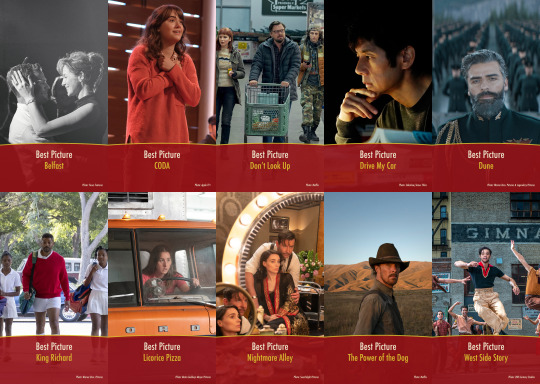
Belfast (3,5)
CODA (4,0)
Don’t Look Up (4,0)
Drive My Car (4,5)
Dune (4,0)
King Richard (4,0)
Licorice Pizza (4,5)
Nightmare Alley (4,0)
The Power of the Dog (4,5)
West Side Story (3,5)
It started off as being Belfast’s to lose. Then that slowly disappeared out of the race and for a long time it looked like it would be a one horse race with The Power of the Dog as the obvious winner. However, that only until the entire cast of CODA hit the stage at the SAG Awards to collect their SAG Ensemble award. Since then CODA has taken home adapted screenplay at BAFTA (ahead of British Belfast) and WGA as well as PGA. Some heavy weight awards to walk into the Oscars with. And it looks like it very well could be enough for CODA, who might also have an advantage in the preferential ballot system. I have a clear idea that CODA is easier to love and it is to hate, whereas The Power of the Dog might be hard to love and easier to dislike. I doubt many people will have The Power of the Dog in the middle of their ballot - it will either take a top spot or a bottom spot, whereas I think CODA will take top spots and middle spots as people tend to put their hated or disliked films in the bottom. Ultimately, however, I think - right now - that The Power of the Dog still have the widest support within the Academy, although I might very well change that five or six times in the run in to show start. It is that close!
Personally, I didn’t directly dislike any of the ten nominees. I was truly impressed with the visual and sonic work in Spielberg’s West Side Story, but I simply never bought the central love story making it a somewhat cold experience for me, which I was surprised by. Maybe it will change on a rewatch. I rated a lot of the films 4 out of 5 stars of which I want to highlight Dune, which I was truly impressed by, but I couldn’t stop feeling it was a long trailer for a much bigger film; awards will rain on the sequel, I’m sure. Nightmare Alley is beautiful and atmospheric but a bit too slow in its second half, and King Richard is one of the best biopics of recent years. CODA is as heartwarming as it gets and a truly well-acted audience pleaser with some much needed and important representation! On a rewatch I changed my score for Don’t Look Up from a 4,5 to a 4, but McKay’s furious bulldozer subtle satire still works surprisingly well for me, although it is still clearly far from the masterpiece The Big Short. Belfast is a nice and lighthearted depiction of war through the eyes of a child featuring some stunning acting and a super interesting sound design, but I lacked some character development and a deeper connection to the story to appreciate it further. The Power of the Dog is in many ways a masterful film, although it might suffer a bit from the same limitations as previous Netflix films from masterful directors such as Alfonso Cuaron (Roma), Martin Scorsese (The Irishman) and David Fincher (Mank) in the sense that it is a bit closed, albeit nowhere near as much as the other films mentioned. With 12 nominations it clearly has widespread and well-deserved support and it grew on me on a rewatch too, taking my third place. My two personal favourites, however, are Drive My Car, which really moved me on a deeper level and was a truly impressive adaptation from Hamaguchi, and Licorice Pizza, which simply is one of the best times I have had in a cinema the last year. Neither of the two stand a chance, though. Personally, I would have loved to see at least one of the following: Flee, Spencer and/or The Worst Person in the World.
Who will win: The Power of the Dog
Potential spoiler: CODA
Personal favourite: Licorice Pizza
Should have been there: Spencer
Actor in a Leading Role
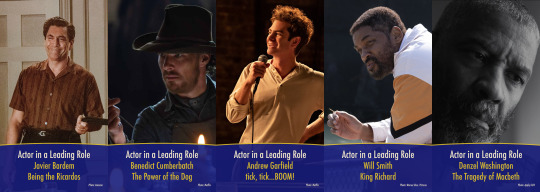
Javier Bardem, Being the Ricardos (2,0)
Benedict Cumberbatch, The Power of the Dog (4,5)
Andrew Garfield, Tick, tick…BOOM! (4,5)
Will Smith, King Richard (4,0)
Denzel Washington, The Tragedy of Macbeth (4,0)
The category that deflated the finale of last year’s Oscars with Anthony Hopkins’ extremely deserved, yet clearly unplanned win, is back with another seemingly clear cut winner in advance this year. Last year, Chadwick Boseman was on everyone’s lips and this year Will Smith’s name is as good as already engraved in the Best Leading Actor Oscar. He is charming and inspiring in King Richard; his best performance since The Pursuit of Happiness and perhaps his career best. The only possible challenger for him seems to be Benedict Cumberbatch who might also give a career best performance in The Power of the Dog; he is as vile as he is fragile and his performance is constantly unnerving. My personal favourite, however, is once again out of tune with the consensus: Andrew Garfield broke my heart in Tick, tick…BOOM! where he sang and performed with all he got as Jonathan Larson. Another career best? The three of them are outstanding! Washington is always good, but yet, to me, he never managed to make The Tragedy of Macbeth more than a(n extremely stunning) visual showpiece. The inclusion of Javier Bardem is honestly insulting to quite a big bunch of actors who gave beautiful, layered performances. Personally, I would have loved to see Nic Cage for Pig, Hidetoshi Nishijima for Drive My Car or one of my personal favourites of the year Peter Dinklage for Cyrano who simply broke my heart with his performance as the titular character; he is one of the most charismatic actors to see and was probably the one closest to getting the nod.
Who will win: Will Smith
Potential spoiler: Benedict Cumberbatch
Personal favourite: Andrew Garfield
Should have been there: Nicolas Cage / Peter Dinklage
Actor in a Supporting Role
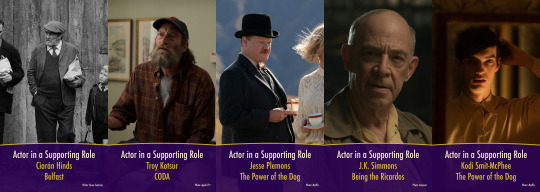
Ciaran Hinds, Belfast (3,5)
Troy Kotsur, CODA (4,0)
Jesse Plemons, The Power of the Dog (4,5)
J.K. Simmons, Being the Ricardos (2,)
Kodi Smit-McPhee, The Power of the Dog (4,5)
Another two horse race involving The Power of the Dog and another two horse race where it looks destined to lose. Kodi Smit-McPhee started award season in a strong way, but - as with Best Picture - the moment Kotsur and the CODA cast took the stage at SAG changed everything. Kotsur has won everything since then and he would be a well-deserved winner as his performance in the film is both extremely funny (completely relying on ASL for the laughs) and heartwarming. Add to that his extreme likability when entering the stage and you have one of the most certain winners of the night. I would not complain with a Smit-McPhee win either, though. Plemons is the least showy in The Power of the Dog, but it was still a nice surprise to see him on nomination morning; he will get a lot closer to an Oscar win in the coming years, I’m sure. Ciaran Hinds is extremely charming in Belfast and creates a lovable character. The inclusion of J.K. Simmons, much like that of Bardem in leading actor, is a disaster; his character was one-dimensional and uninspired. Considering the amount of beautiful supporting actor performances we have had this year, his inclusion could only have been topped by the inclusion of Jared Leto for House of Gucci. With all this being said, I have to highlight Jason Isaacs in Mass - it is a crime that he wasn’t nominated. Heck, I honestly think he should be winning. Mike Faist for West Side Story could also have deserved a nomination here and so could Anders Danielsen Lie in The Worst Person in the World, although you could argue that he balances on being a lead.
Who will win: Troy Kotsur
Potential spoiler: Kodi Smit-McPhee
Personal Favourite: Troy Kotsur
Could have been there: Jason Isaacs (Mass)
Actress in a Leading Role

Jessica Chastain, The Eyes of Tammy Faye (3,5)
Olivia Colman, The Lost Daughter (3,5)
Penélope Cruz, Parallel Mothers (3,5)
Nicole Kidman, Being the Ricardos (2,0)
Kristen Stewart, Spencer (4,5)
Just as last year, this category is all up in the air! Before the awards season started everyone had Kristen Stewart as a clear winner, then she lost Golden Globe to Nicole Kidman who took the favourite tag especially as Kristen Stewart missed several nominations. Then Lady Gaga took over for House of Gucci only to not even get an Oscar nomination allowing Chastain to take over with wins at SAG and Critics Choice. And now, after the release of secret Oscar ballots, Penélope Cruz looks ready for a last minute surge. Who will win??? It looks like Chastain, who I really liked in Tammy Faye, but look out for Cruz or Colman! Both of them deliver amazing work in their films and they are extremely well-liked in Hollywood and I might very well end up going with a surprise last minute win for Cruz. Stewart’s performance in Spencer is in my eyes easily the best performance of the year, but the general lack of love for the film makes it hard to imagine a world where she wins, and Kidman seems to be out of the race again too. Renate Reinsve should have been here for The Worst Person in the World and so should Alana Haim for Licorice Pizza.
Who will win: Jessica Chastain
Potential spoiler: Penélope Cruz
Personal favourite: Kristen Stewart
Could have been there: Renate Reinsve and Alana Haim
Actress in a Supporting Role
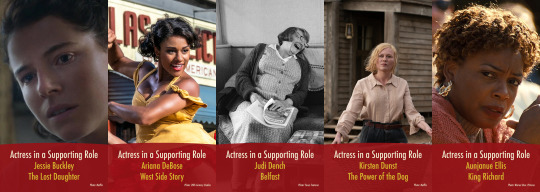
Jessie Buckley, The Lost Daughter (3,5)
Ariana DeBose, West Side Story (3,5)
Judi Dench, Belfast (3,5)
Kirsten Dunst, The Power of the Dog (4,5)
Aunjanue Ellis, King Richard (4,0)
One of the easiest categories to call of the evening. If Ariana DeBose doesn’t win for her scene stealing performance in West Side Story then it is easily one of the biggest shocks in recent Oscar history; she has won EVERY important award until now. While she is very good, my personal favourite of the five nominees is Jessie Buckley who simply gets better and better, and for me, she stole the show in The Lost Daughter. Ellis has some stunning scenes in King Richard and Dunst has rarely been better. Dench is biggest question mark here - she’s just here on merit, right? The fact that she was picked ahead of Caitriona Balfe for Belfast has been widely discussed and righly so - Balfe is the heart of that film and the only possible explanation is that many people placed her in lead… Anne Dowd and Martha Plimpton in Mass really should have been in contention here, albeit Plimpton could have been placed in lead.
Who will win: Ariana DeBose
Potential spoiler: None (but Dunst if I have to pick one)
Personal favourite: Jessie Buckley
Should have been there: Anne Dowd (Mass)
Animated Feature Film

Encanto (4,0)
Flee (5,0)
Luca (4,0)
The Mitchells vs the Machines (4,0)
Raya and the Last Dragon (3,5)
The Disney category is more Disney than ever this year with three of five nominees. Flee is the only masterpiece of this year’s nominees in my opinion, yet I don’t think it will take home any Oscar, because the love for it will probably be split between categories. It’s not my personal favourite in this category either. Encanto looks destined to win with its stunning animation and record beating soundtrack, however The Mitchells vs the Machines is the most playful of the films and Luca packs the most moving story. Raya and the Last Dragon is the weakest the category has to offer, although it in no means is a bad film.
Who will win: Encanto
Potential spoiler: The Mitchells vs the Machines
Personal favourite: The Mitchells vs the Machines
Cinematography
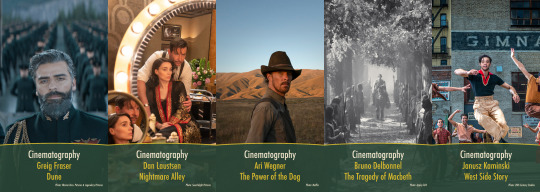
Greig Fraser, Dune (4,0)
Dan Laustsen, Nightmare Alley (4,0)
Ari Wegner, The Power of the Dog (4,5)
Bruno Delbonnel, The Tragedy of Macbeth (4,0)
Janusz Kaminski, West Side Story (3,5)
Perhaps the best line-up of any category this year. Five amazing examples of cinematography. Fraser’s work in Dune is otherworldly and stunning in its many sci-fi vistas, Laustsen continues his atmospheric and dark collaboration with del Toro in Nightmare Alley, Wegner’s grand vistas in The Power of the Dog makes it one of the most stunning films of the year, Delbonnel creates some fascinating images in The Tragedy of Macbeth and Kaminski’s opening scene in West Side Story makes his nomination well-deserved for a film that packs plenty of cinematography magic. I honestly will not complain no matter who wins, but Fraser walks into the night as the favourite perhaps strengthened by people’s admiration for his current work on The Batman. Look out for Wegner, however, as her work is equally stunning and she has picked up a couple of wins. I would have loved to see Claire Mathon recognised for her work on Spencer, but I don’t know what to kick out if I’m honest.
Who will win: Dune
Potential spoiler: The Power of the Dog
Personal favourite: The Power of the Dog
Could have been there: Spencer
Costume Design

Cruella (3,5)
Cyrano (3,5)
Dune (4,0)
Nightmare Alley (4,0)
West Side Story (3,5)
If a film about two fashion designers battling against each other with two very distinct styles, which features a ton of costumes should not win this category, what should? And so it will be; Cruella is destined to take this home and it would be well-deserved.
Who will win: Cruella
Potential spoiler: Dune
Personal favourite: Cruella
Directing

Kenneth Branagh, Belfast (3,5)
Ryusuke Hamaguchi, Drive My Car (4,5)
Paul Thomas Anderson, Licorice Pizza (4,5)
Jane Campion, The Power of the Dog (4,5)
Steven Spielberg, West Side Story (3,5)
Last year was a historic year for this category; the first time that two female directors were nominated in the same year. This year we only have one, but she will undoubtedly win. Jane Campion’s admirable work with The Power of the Dog looks unbeatable and she could have gotten well-deserved female company from Maggie Gyllenhaal (The Lost Daughter) or Julia Ducournau (Titane). However, the biggest snub here is the omission of Denis Villeneauve for his work on Dune; a work often labelled un-adaptable that goes on to get 10 nominations but not for directing? Get out! Hamaguchi’s work is beautiful, but his screenplay is even stronger than his directing. West Side Story and Belfast are clear passion projects, but I definitely think that Spielberg’s direction is the strongest of the two. Finally, PTA just knows how to set up memorable scenes.
Who will win: Jane Campion
Potential spoiler: Steven Spielberg
Personal favourite: Jane Campion
SHOULD have been there: Denis Villeneuve
Documentary (Feature)

Ascension (4,0)
Attica (4,0)
Flee (4,0)
Summer of Soul (…or, when the revolution could not be televised) (4,5)
Writing With Fire (3,5)
If Flee had only been nominated in this category it would have won and frankly, it should win! One of the best documentaries of recent years. However, Summer of Soul looks like the winner, and to be fair it is brilliant film that flawlessly manages to mix the stunning concert footage into a socio-political context to make a both entertaining and thought-provoking film. Ascension was deeply fascinating, Attica was a hard watch and Writing With Fire was deeply inspiring, albeit a bit uninspired film-wise. But a great year for documentaries!
Who will win: Summer of Soul (…or, when the revolution could not be televised)
Potential spoiler: Flee
Personal favourite: Flee
Documentary (Short Subject)
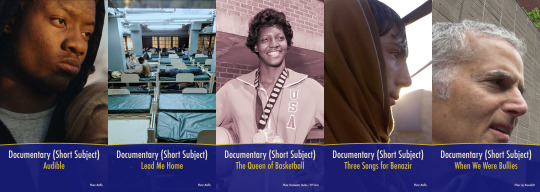
Audible (3,5)
Lead Me Home (2,0)
The Queen of Basketball (4,0)
Three Songs for Benazir (3,5)
When We Were Bullies (have not seen this)
A category that is historically difficult to predict. However, this year The Queen of Basketball seems like quite a good pick in a somewhat disappointing year. Audible is its closest competitor as Three Songs for Benazir felt a bit too short and something felt off with Lead Me Home’s stylish take on its deeply sad focus.
Who will win: The Queen of Basketball
Potential spoiler: Audible
Personal Favourite: The Queen of Basketball
Film Editing
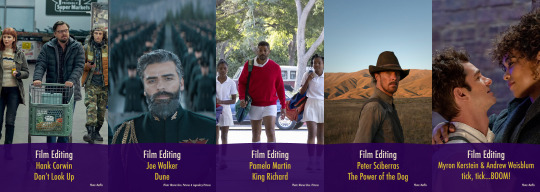
Don’t Look Up (4,0)
Dune (4,0)
King Richard (4,0)
The Power of the Dog (4,5)
Tick, tick…BOOM! (4,5)
We have all the different types of editing in place here. The fast-paced, playing-an-active-part-in-the-film editing of McKay’s satires in Don’t Look Up, impressive action editing in Dune, fast-paced sports and montage editing in King Richard, seemless editing in The Power of the Dog and the more artistic and musical-based editing of Tick, tick…BOOM! A good thing to have in mind when predicting here is the obvious editing for the naked eye. King Richard or Tick, tick…BOOM! look like good bets then, but I have an idea that Dune will come close to a technical sweep and as such it needs this as well, but look out for the two others. West Side Story could have been in the mix here!
Who will win: Dune
Potential spoiler: King Richard
Personal favourite: Tick, tick…BOOM!
Could have been there: West Side Story
International Feature Film

Drive My Car (4,5)
Flee (5,0)
The Hand of God (3,0)
Lunana: A Yak in the Classroom (3,5)
The Worst Person in the World (4,5)
Drive My Car is up for four Oscars including Best Picture. This race is looking like a non-brainer. Flee is deserving and so is The Worst Person in the World, but they don’t seem to stand a chance. Lunana was a nice surprise and it will get a well-deserved attention boost thanks this nomination. I didn’t care that much for The Hand of God and would have liked it (VERY MUCH) if Titane had taken its place.
Who will win: Drive My Car
Potential spoiler: The Worst Person in the World
Personal favourite: Flee
Should have been there: Titane
Makeup and Hairstyling
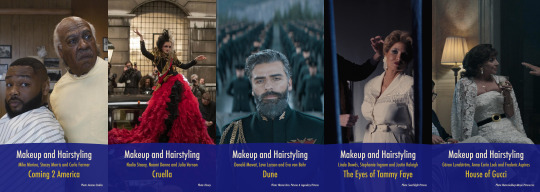
Coming 2 America (1,5)
Cruella (3,5)
Dune (4,0)
The Eyes of Tammy Faye (3,5)
House of Gucci (2,0)
The only nomination for the travesty that was House of Gucci and it will not get close to winning it despite its prosthetic work. Prosthetics were done better in both Dune and especially Coming 2 America. I think The Eyes of Tammy Faye will ride on the possible win for Chastain, but look out for the transformations of Eddie Murphy and Arsenio Hall in Coming 2 America. Cruella is here for the hairstyling but it will settle for its costume win. Again, Titane should have been there!
Who will win: The Eyes of Tammy Faye
Potential spoiler: Coming 2 America
Personal favourite: Dune
Should have been there: Titane
Music (Original Score)
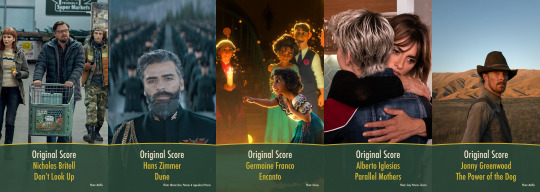
Don’t Look Up (4,0)
Dune (4,0)
Encanto (4,0)
Parallel Mothers (3,5)
The Power of the Dog (4,5)
Some strong scores here, with Zimmer looking like the clear winner for his loud, ominous work on Dune. Iglesias’ score for Parallel Mothers is brilliant and controls the film like no other nominee. Greenwood comes closest to doing that with his work in The Power of the Dog and he should have been here for Spencer as well. However, the scores of Britell and Franco in Don’t Look Up and Encanto are the most listenable outside of their films.
Who will win: Dune
Potential spoiler: Parallel Mothers
Personal favourite: The Power of the Dog
Should have been there: Spencer
Music (Original Song)

“Be Alive”, King Richard (4,0)
“Dos Oruguitas”, Encanto (4,0)
“Down to Joy”, Belfast (3,5)
“No Time to Die”, No Time to Die (4,0)
“Somehow You Do”, Four Good Days (2,5)
Disney are hating themselves for not letting “We don’t talk about Bruno” compete, although “Dos Oruguitas” is a stunning song that might just ride on the back of the record beating hit to give Lin-Manuel Miranda his EGOT. However, Billie Eilish and Beyonce would want a word in that fight with Eilish looking like the winner. Diane Warren is here again, because you know - apparently she has to, and “Down to Joy” is bland, although it is a plus that it is featured in the actual film. “Just Look Up” should have been there, as should “Beyond the Shore” from CODA.
Who will win: “No Time to Die”
Potential spoiler: “Dos Oruguitas”
Personal favourite: “Dos Oruguitas”
Should have been there: “Beyond the Shore”
Production Design

Dune (4,0)
Nightmare Alley (4,0)
The Power of the Dog (4,5)
The Tragedy of Macbeth (4,0)
West Side Story (3,5)
Five stunning films here highlighted by their corresponding cinematography nominations. While I think Dune will get that one, I think it might just lose this one to Nightmare Alley. Will the Academy go with the extremely impressive world building of Dune or the atmospheric del Toro magic of Nightmare Alley? It will be very close. Cyrano and Spencer could have been there, but who should they replace really?
Who will win: Nightmare Alley
Potential spoiler: Dune
Personal favourite: Nightmare Alley
Could have been there: Cyrano/Spencer
Short Film (Animation)
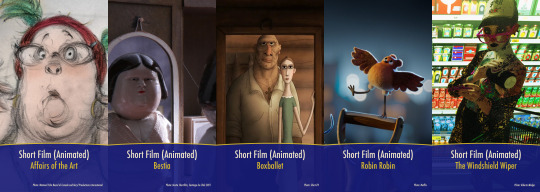
Affairs of the Art (2,5)
Bestia (3,0)
Boxballet (have not seen it)
Robin Robin (3,5)
The Windshield Wiper (4,0)
The most adult line-up in this category for years. Affairs of the Art and Bestia are quite disturbing, while The Windshield Wiper is stunning and fascinating. Robin Robin looks like the favourite and it is extremely charming and cute, but I am going for a surprise win for The Windshield Wiper.
Who will win: The Windshield Wiper
Potential spoiler: Robin Robin
Personal favourite: The Windshield Wiper
Short Film (Live Action)
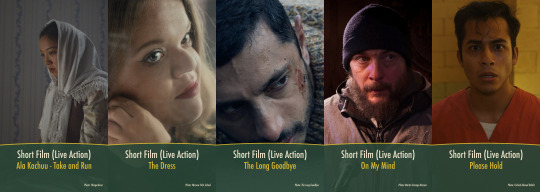
Ala Kachuu - Take and Run (4,0)
The Dress (3,0)
The Long Goodbye (4,0)
On My Mind (2,5)
Please Hold (have not seen this)
The Long Goodbye is hard-hitting and can feel slightly un-finished, but it is strong and has the star factor of Riz Ahmed, although that didn’t help The Letter Room (Oscar Isaac) last year. Danish contender On My Mind felt way too constructed and managed to feel overlong despite its 18 minute runtime. Finally, Ala Kachuu and The Dress are hard to watch, but Ala Kachuu seems to have a lot more heart and sympathy for its subject and, thus, it looks like the one to beat The Long Goodbye if one has to. Unless it will be the Black Mirror-ish Please Hold, which I sadly have not seen.
Who will win: The Long Goodbye
Potential spoiler: Ala Kachuu - Take and Run
Personal favourite: The Long Goodbye
Sound

Belfast (3,5)
Dune (4,0)
No Time to Die (4,0)
The Power of the Dog (4,5)
West Side Story (3,5)
Belfast has an interesting sound design as one of its strongest assets and the sound design of The Power of the Dog really helps build its atmosphere. However, it seems like it will be between the remaining three. Of them Dune seems like the strongest, but look out for West Side Story. If Edgar Wright’s Last Night in Soho should have been anywhere, it probably should have been here.
Who will win: Dune
Potential spoiler: West Side Story
Personal favourite: Dune
Visual Effects
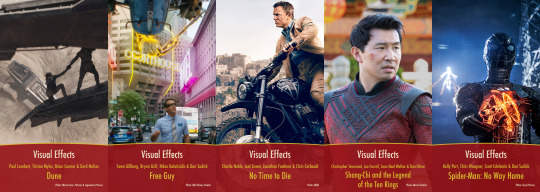
Dune (4,0)
Free Guy (3,0)
No Time to Die (4,0)
Shang-Chi and the Legend of the Ten Rings (3,5)
Spider-Man: No Way Home (4,0)
Last year I wrote: “A category that would probably have been dominated by films such as Godzilla vs. Kong, Dune and Black Widow in a normal 2020.” Of these, only Dune made it into the category in the end. Free Guy is the surprise addition here with is playful effects, and also this is the only option to give Spidey an Oscar, although Shang-Chi arguably had better special effects. However, Dune looks destined to win this as its effects played an integral part in its world building.
Who will win: Dune
Potential spoiler: Spider-Man: No Way Home
Personal favourite: Dune
Writing (Adapted Screenplay)
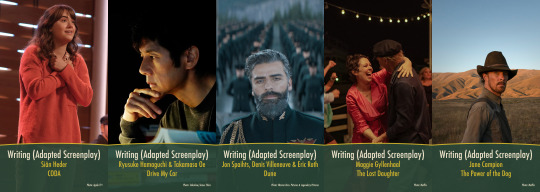
CODA (4,0)
Drive My Car (4,5)
Dune (4,0)
The Lost Daughter (3,5)
The Power of the Dog (4,5)
While I really liked CODA, I think it is wild that it might just beat (in particular) Drive My Car in this category. That ought to be winning, but The Power of the Dog looks like the one to beat for CODA as in Best Picture. And I actually think it will, even though it might just be the weakest of these five screenplays.
Who will win: CODA
Potential spoiler: The Power of the Dog
Personal favourite: Drive My Car
Writing (Original Screenplay)

Belfast (3,5)
Don’t Look Up (4,0)
King Richard (4,0)
Licorice Pizza (4,5)
The Worst Person in the World (4,0)
I thought this would be Paul Thomas Anderson’s spot for finally winning an Oscar, but him losing the WGA to Adam McKay for Don’t Look Up was quite the curve ball. Maybe Branagh will take it home for Belfast, although I did have some issues with his writing here. Can McKay do it with Don’t Look Up? It seems too divisive, but it is in no way impossible. The real winner, however, should be The Worst Person in the World and I would love for it to win! Fran Kranz’ screenplay for Mass should have been here easily knocking King Richard out of the five.
Who will win: Belfast
Potential spoiler: Don’t Look Up
Personal favourite: The Worst Person in the World
Should have been there: Mass
I wish everyone the best of Oscar nights! May the best films win!
#Oscars 2022#Academy Awards#Oscar Predictions#The Power of the Dog#Dune#West Side Story#King Richard#Coda#Drive My Car#Nightmare Alley#Licorice Pizza#Belfast#Don't Look Up
4 notes
·
View notes
Photo

Reflective moments of stillness
(Review of ‘Drive My Car’ watched on the 19th of March 2022)
***Features spoilers for “Drive My Car”***
Japanese writer Haruki Murakami is one of the most popular and widely read modern Japanese writers, whose novels and short stories are often deemed hard to adapt into films because of their complex nature. They are, however, also still subject to plenty of adaptations trying to and hoping to achieve the same multi-layered perspective on life as the original material. Recently the south korean “Burning” did this with great success winning two awards at the Cannes Film Festival winning over critics and movie lovers alike in the process. The newest adaptation of a Murakami short story is Riûsuke Hamaguchi’s three hour slow burner “Drive My Car” that follows in the slipstream of recent years’ big critical AND commercial success of Asian cinema in the world community. Having always been popular among film critics and fans, Asian cinema has reached broader in recent years following the success of films and series like “Parasite”, “Minari” and “Squid Game” from or influenced by Korean cinema. “Drive My Car” has the potential to become more people’s pathway to Japanese cinema as it too has gained more mainstream attention overseas with four major Oscar nominations including Best Picture, Best Director and Best Adapted Screenplay. As with the aforementioned productions, it is doing so not by pandering to western cinematic values and ideas, but by being unapologetically brilliant filmmaking speaking to universal values and aspects of life itself.
As stated the film is a slowly paced three hour long drama and the epitome of a slow burner. The first 40 minutes serve as a kind of prologue for the “actual” film that follows as we are introduced to and allowed to observe the marriage between Yûsuke Kafuku, a theatre actor, playwright and director, and Oto Kafuku, his wife and a popular screenplay writer. We are not being told what is up and what is down in their relationship, but we are shown both their working and romantic relationship while we are slowly exposed to both dark events from the past and present. But we are never being told what to think of their actions (and/or lack of actions) when life unravels before their and our eyes. The prologue ends tragically with the death of Oto as we enter the remaining 140 minutes of runtime and skip ahead two years into the future following Yûsuke as he is still struggling to come to terms with his wife’s death and finding his way out of the darkness his life has been submerged into. Maybe the answer is to go to the theatre festival in Hiroshima, where he is hired to direct a multilingual production of Chekhov’s “Uncle Vanya”; a play that has made him famous as he starred as Vanya. While doing so he listened to and practised his lines in his car everyday using a tape where Oto has recorded all the other lines. In Hiroshima he is given a driver (a festival rule that he must obey) and from then on the film takes us on a slow and complex ride through a meditative mix of road movie and complex philosophy over the course of the 8 week production period. The film mainly consists of either scenes from the rehearsals and conversations between Yûsuke and his driver, the introverted young Misaki Watari who holds on to quite a few secrets herself.
At its emotional core, the film has a stunning performance from Hidetoshi Nishijima who is sombre and full of character and soul as Yûsuke. Nishijima is very believable as a man caught in the darkness of his own life choices, the pain and grief of life and the gradual development of a new connection. He is a man of few words when he is not reciting his Vanya lines in the car, and, thus, Nishijima has to convey a lot of character development through his body and facial expressions. Demands which he luckily has no issues in meeting. His performance is one of the least showy of the year, but that doesn’t make it any less moving. You might sit during the film and wait for him to give everything he has as the grieving, depressed widower, but he remains perfectly restrained making the final twenty minutes all the more devastating and powerful as his slow metamorphosis (to give a nod to Kafka to whom Yûsuke’s last name is also an homage) is completed. As Yûsuke slowly opens up allowing himself to feel and break his numb we do the same thing as the audience and this is proof that Nishijima has us wrapped around his little finger during the entire film. A compelling, mesmerising character development.
Yûsuke’s character development is heavily fuelled during the many hours in his old Saab with his new driver, Misaki, who - just like him - comes across as silent and introvert. As Misaki, Toko Miura, too gives a nuanced and rewarding performance holding an unspoken, yet fascinating chemistry with Nishijima. Miura breathes life into another troubled soul and as she gradually reveals some dark secrets of her past, we feel her emotions as every secret is a load off her mind. Just as with Nishijima’s performance, Miura is anything but showy. Nevertheless, she packs in loads of complexity to the driver of few words. The way she gradually opens her face and raises her head as Misaki opens up to Yûsuke is stunning work from the young actress. A shame that their performances have probably been deemed too restrained to gain true awards attention on the biggest scene.
Of the remaining cast, it is young Masaki Okada as Kôshi Takatsuki who plays the biggest part in Yûsuke’s transformation. Takatsuki is a young and succesful actor who is closely connected to Yûsuke’s wife Oto who has written some of the tv dramas that has made him a superstar. When Yûsuke has to cast the festival production of Uncle Vanya he ends up casting Takatsuki despite him falling from stardom (after an alleged relationship with a minor) and a devastating discovery Yûsuke made prior to his wife’s death. This gives the film’s perhaps most openly dynamic relationship as Yûsuke and Takatsuki clash on both the play, view on women and the slow reveal of Takatsuki and Oto’s past. However, Okada’s Takatsuki also becomes pivotal for the transformation of Yûsuke during a particularly well-acted driving sequence where Takatsuki philosophises about man’s ultimately impossible desire to fully understand our loved ones. Okada delivers this monologue with a presence and a nerve that touched me deeply.
As Oto, Yûsuke’s wife, Reika Kirishima has a strong presence in the first 40 minutes before her death. She gets enough to work with to create a complex character that stays with us for the rest of the film helping us to understand Yûsuke’s journey. Kirishima is charismatic - especially as Oto comes up with her latest storylines in a sensual setup of improvisation highlighting the blurry lines between Oto and Yûsuke’s professional and romantic connection. Finally, I find that Park Yu-rim and Jin Dae-yeon are worth highlighting for their performance as a Korean couple that Yûsuke gets to learn through the theatre production. Yu-rim as a numb actress cast in the play and Dae-yeon as the dramaturg and translator on the production. There is a scene in their house, which is so filled with love and human connection that it stands as a heart-warming, shoulder-lowering highlight of the film.
While the restrained and nuanced acting performances is one of the strong assets of “Drive My Car” its strongest asset must be the screenplay by director Riûsuke Hamaguchi and Takamasa Oe adapted from Murakami’s short story of the same name from 2014. While the short story only takes place in the car between Yûsuke and Misaki, Hamaguchi and Oe has included elements from other short stories to build upon Yûsuke’s world and character. This is no easy task, but they have created a near perfect screenplay that is definitely helped by them being given a three hour runtime, which never feels too long or too boring; the screenplay is perfectly balanced and paced allowing us to really get a deep connection with the characters making their individual end destinations more satisfying. Apart from the character development, the long runtime also allows us as viewers to dwell on what we are seeing, asking questions about ourselves along the way. It is only a masterfully written screenplay that manages to juggle such deep philosophy on some of life’s biggest questions and emotions while remaining entertaining.
On the technical side, the cinematography from Hidetoshi Shinomiya is - like the rest of the film - restrained and anything but showy. This does make the film’s visual side rather straight forward, but I still want to mention some interesting work with mirrors during the prologue and some stunning driving shots throughout the film. Especially those looking behind the car highlighting the long and winding road left behind as Yûsuke continues his journey forward. The music by Eiko Ishibashi is never controlling your emotions or overdone, but it does help create the close to meditative nature of the many driving sequences in particular. Finally, the sound department creates one particularly touching yet simple scene towards the end when Yûsuke and Misaki are driving to her hometown and all of a sudden all sound disappears for just 10 to 15 seconds. But instead of thinking something went wrong, I was completely knocked out by this moment of complete stillness heightening my senses and my awareness, which - only for a glimpse of a moment - allowed me to just sit and dwell on my own emotions.
A strong moment and a great example of how Hamaguchi with seemingly simple measures manages to produce strong emotional depth. Hence, the success of the screenplay and the acting is helped along the way by Hamaguchi himself through his directing, which is both brave and fearless. He is never afraid to let his characters sit in stillness, to leave things unsaid or to have his characters convey complex philosophical metaphors and emotions. It takes confidence in your material and your actors to do this; Hamaguchi has plenty of that. Finally, his choice to have the on-going theatre production be multilingual is a clever touch as it highlights the universalism of the film’s philosophical elements and its focus on the basic human need for connecting with other people. When that’s our need, language is only a small barrier - perfectly illustrated by the theatre production and the scene in the home of Dae-yeon and Yu-rim’s characters.
In the end, “Drive My Car” ended up having quite a substantial impact on me. At one point Kafuku mentions that saying Chekhov's words drags out the real you by asking you the same questions of yourself as it asks its characters. In many ways, Hamaguchi's film has the same effect. With the ways he grands you time to dwell on your own emotions, your own reflections, you end up exploring your own thoughts about some of life’s biggest questions: What is love? What is sorrow? How do we move on from grief? And is there always an answer to be found to the mysteries or troubles of life? The film is just as much about us exploring these questions ourselves as it is about following Yûsuke and Misaki’s journey towards their understanding of these questions. In the previously mentioned conversation between Yûsuke and Takatsuki, the latter asks, “Can any of us ever perfectly understand another person? However much we love them?” implying the impossible nature of the very human need of understanding the people we surround ourselves with. Takatsuki’s point is that we can only truly understand our own heart, and, thus, we must strive to do this with everything we have, to be true to ourselves. Yûsuke’s journey can inspire us to look inwards and ultimately that is a much more rewarding experience than - simply - seeing Yûsuke’s own emotional transformation. We shouldn’t spend our life, our precious life trying to understand everything and everyone in the world, because in the end everything is. Hurt and pain. Love and joy. Grief and sorrow. Attraction and connection. And we live through it; we must. And we will.
4,5/5
#Oscars 2022#Academy Awards#Oscars#Oscars Warm Up#Film Review#Movie Review#Drive My Car#Doraibu mai kâ#Haruki Murakami#Riûsuke Hamaguchi#Hidetoshi Nishijima#Toko Miura#Masaki Okada#Reika Kirishima#Park Yu-rim#Jin Dae-yeon#Takamasa Oe#Hidetoshi Shinomiya#Eiko Ishibashi#Best Picture#Best Director#Best International Feature Film#Best Adapted Screenplay
1 note
·
View note
Photo
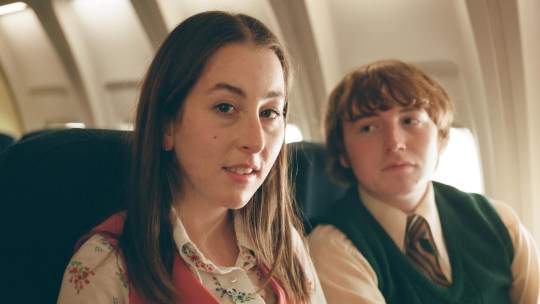
“What would I give to just have you near”
(Review of ‘Licorice Pizza’ watched on the 17th of March 2022)
Has Paul Thomas Anderson ever made a bad film? That is one of the discussions surrounding the critically acclaimed auteur whose filmography features early films such as Boogie Nights and Magnolia along with more recent films such as 2007’s intense There Will Be Blood, 2012’s The Master and most recently the surprisingly delightful Phantom Thread in 2017. Now he is back with Licorice Pizza in which he once again delivers a brand new feeling in comparison to earlier films while never forgetting about some of his trademarks of brilliantly directed acting performances and delightfully constructed and balanced scenes. At the heart of the film we don’t find recurring stars from his filmography such as Daniel Day-Lewis (of There Will Be Blood and Phantom Thread) or Joaquin Phoenix (of The Master and Inherent Vice); instead we have fellow debutants Cooper Hoffman (son of late Phillip Seymour Hoffman who starred in The Master) and Alana Haim (from the band Haim with whom PTA is close friends being the director of their music videos). With this fresh duo at its core Licorice Pizza is both a love story, a love letter to the 70’s and above all one of the best coming-of-age stories in my recent memory. So no, Paul Thomas Anderson still hasn’t made a bad film.
The film kicks off at a high school in San Fernando Valley (where PTA grew up), where 15-year-old Gary prepares for the annual school photos. This is where he first meets 25-year-old Alana who works as an assistant for the school photographer. He is the only one opting to take a look in the mirror that her job is to offer the kids waiting for their photos to be taken. Gary is instantly infatuated by Alana who is slowly caught off guard by this young man’s charm, drive and seemingly endless self belief when talking up the 10 year older woman in front of him. Despite her constant refusals of the possibility of accepting his invitation to the Tail O' the Cock; a restaurant the teenager frequently visits - along with Hollywood stardom - she ends up going there - perhaps just for the fun of it or perhaps because she is weirdly drawn to him. This is where their relationship begins even though none of them ever are too sure what this relationship truly is. She begins as his chaperone as she proudly tells unknowing audience members at a tv show performance in New York, and throughout the film they are constantly asked about the nature of the relationship never really knowing exactly what to answer; are they business partners, friends or are they actually boyfriend/girlfriend? In the end it doesn’t really matter to them (they know they are in each other’s lives and the constant questions are reminders of this) or to us, because what follows is a sensational journey through PTA’s childhood neighbourhood as we explore Gary and Alana come of age navigating through first love, infatuations, frustrations and adventures. And this is simply close-to-perfect film company to be in.
As Alana, Alana Haim delivers one of the most spell-binding debuts in recent memory as the 25-year-old Alana, who cannot really find her place in life and seeks a way out of her very religious jewish family (played by Alana Haim’s own family) as she brutally honest tells her father in an early scene in the film. Alana is caught in between the care-free teen years and demanding adulthood - perfectly illustrated by her initially helping to take photos of high schoolers (thus immortalising their teenage state). She is drawn to Gary by his charm, his wits and his adult-like behaviour (asking her out to dinner, running his own businesses) as she explains to a friend early on, but ever so often she becomes painfully aware of the age gap between them and seeks the attention of the generation above her; only to then become painfully aware of their nature and how shitty they often treat her. Haim perfectly captures the frustrations this causes for Alana and she has several scenes in which her facial mannerisms in particular showcases the conflicting emotions of her character - most perfectly exemplified towards the end when she is caught in the middle of a heated discussion in a restaurant. Alana Haim should - in my opinion - have received an Oscar nomination for this performance, but the fact she didn’t takes nothing away from her Alana. She is as powerful as she is conflicted, as charming as she is quirky and her natural on-screen charisma makes Gary’s initial infatuation with and gradually dependence on her not only believable but also relatable. Their chemistry is so naturally charming that I simply could not help sitting with a smile on my face for most of the film’s 133 minutes running time.
Apart from Haim this is due to the other - and (almost) equally great - first-timer, Cooper Hoffman’s turn as Gary. Gary is a complex person and this is one of the aspects that draw Alana closer to him. You get the sense that he has been exposed to adult life early on in life; he is a child actor having starred in several film hits and at home he’s very used to being alone with his little brother. His mother is often away with work - a work which Gary assists her in on several occasions providing him with a network and a business know-how - and his father is never seen. Gary is in the age where actual adulthood is knocking on the door of his carefree adolescence and it is in this development combined with Gary’s early exposition to adult life that the character becomes as interesting as he is. He is enterprising as seen when he opens and develops several succesful businesses, but it somehow always feels like a fantasy, a child’s play as he runs these businesses with his 15-year-old (or younger) friends. Hoffman is utterly charming as he balances the need to stay in his childlike innocence and his desire to be older to show Alana his inner man. His screen presence is extremely natural and he is at times very funny. Just as Haim, Hoffman is a natural talent that it will be extremely interesting to follow in the coming years.
The aspect that makes Gary’s character and storyline even more interesting, however, is when you look at it through all the - often - scene stealing cameos from super star actors as the grown men that Gary and in particular Alana meet in their life. With Gary having no father figure around these men are not only his competitors in regards to winning over Alana in most cases, they are also possible role models - or perhaps even possible mirrors of who Gary risk becoming if he gets lost in his dreams of business and stardom.
***The following contains spoilers***
The first of these men, that we meet, is also the most controversial: John Michael Higgins as the restaurant owner Jerry Frick which Gary meets when he helps his mother at work. Frick is the owner of a Japanese restaurant and married to Mioko towards whom he is blatantly racist; you get the feeling that she is mainly there to bring authenticity to his restaurant - underlined by the fact he has a new (also Japanese) wife later in the film, who he treats similarly. His scenes has been met with controversy because of this, but if you think these scenes make the film racist, I think you completely miss the point. Frick is presented as a racist ignorant and he doesn’t meet any approval from any of the film’s other characters. Later on, after Alana enters the world of acting, she ends up going out with star Jack Holden played by Sean Penn, who is clearly having a good time portraying the self-centred actor, who mainly takes Alana out as she “reminds him of Grace” (Kelly). As soon focus is on Holden he quickly forgets everything about the starstruck and initially flattered Alana. In this scene Tom Waits also has a funny cameo as a drunk film director who cannot escape his world of film making. Ben Safdie plays a seemingly polished politician whose work and agenda convinces Alana that she is a politician and important in Wachs’ mission to “save the world”, but once again he reveals another version of himself as soon as Alana comes closer to him.
Finally, Bradley Cooper delivers the most hyped cameo as Jon Peters - a Hollywood producer married to Barbara Streisand and the only of the many characters inspired by real life to keep his real name. Cooper’s performance is unhinged and constantly balancing on the edge of mayhem. Unlike the other adults who they meet, Peters immediately reveals his real self by more or less bragging about it to Gary. Despite being married to one of the biggest stars of his time, he gets all the tail he wants (and that’s a lot apparently); apart from his adultery he quickly reveals his explosive temper as well. Cooper’s scenes are the only ones where you fear that the breezy atmosphere is threatened for real as he flirts and threats his way through the streets of the neighbourhood. You cannot help but feel that Cooper was having a blast playing the producer, who in recent years have faced several abuse cases after - for instance - being credited as producer on Cooper’s own A Star Is Born.
All these questionable male role models for Gary and ultimately disappointing and/or abusive targets for Alana’s own infatuations are accompanied by even smaller yet also great female cameos of Lucy Doolittle (a diva-like portrayal of Lucile Ball by Christine Ebersole), Maya Rudolph’s “I will roll my eyes, as you turn away” production assistant and Gary’s child actor agent highlighting that Alana would get many more roles if she wanted to do nudity. Together this gallery of supporting roles and cameos highlight all the unappealing aspects of adulthood; whether it is by being poor role models, endless disappointments or representatives of the problematic show business. They make Alana and Gary’s connection grow and allows us - the audience - to feel the same kind of escape when they spend time together as they feel. A stroke of genius from Paul Thomas Anderson and one of the film’s strongest assets in my opinion. It takes a great writer to have such funny scenes play such a pivotal part in your main relationship as well. And it takes a great director to make two debutants come out on top in such a cornucopia of celebrity cameos that also includes loads of small love letters from PTA to his friends and collaborators in Hollywood. As a matter of fact, I do not think this film would have worked if either Alana or Gary had been played by well-known faces. The fact that we don’t know them makes them even more believable, even more relatable.
*** End of spoiler alert ***
These brilliant choices is, obviously, what film lovers across the world has come to expect from a Paul Thomas Anderson film. The auteur who writes, produces, directs and - with Phantom Thread and Licorice Pizza - films his own films is a master of his craft. Last time out he took us on an almost hitchcockian journey through the London fashion world in the 1950’s and it is impressive how he now once again takes a completely different approach with this film that is a film that speaks to your feelings more than your desire for a big and clear storyline. I could not help but think about Tarantino’s Once Upon a Time in Hollywood; not because they share story elements or anything, but because they both ooze with their directors’ style, characteristics and perhaps most clearly their love and personal connection to the area and time period that they bring to live on the big screen.
In one of the many well-picked songs in this film, Clarence Carter sings “What would I give for just a few moments” and when I listened to this song again on the train today after watching the film, I could not help but think exactly that. What I wouldn’t give for just a few moments in PTA’s nostalgic version of the San Fernando Valley here. PTA has created a film with an atmosphere that you disappear into and I was not really ready to let go when the end credits rolled over the silver screen. Apart from the acting, the well-balanced writing and Anderson’s personal investment in the project, this is also because of the amazing 70’s soundtrack. Jonny Greenwood’s score takes to the background here (in an impressive year also boasting scores for Spencer and The Power of the Dog for the Radiohead man), while the likes of Nina Simone, David Bowie, Paul McCartney and Sonny and Cher takes the centre stage. It is very rare that I nod along to the music in a cinema, but I did that here.
And that’s the case for me with this film. I was simply absorbed by it and fascinated by its characters and the obvious love PTA has for them. While Gary is drawn to the adult life that he so quickly has been introduced to and Alana is - in many ways - trying to escape or at least postpone the same adult life creeping up on her, they find each other in this limbo of undeniable, relatable and honest connection, love and fascination. Meanwhile they try to find their individual places in a jungle of problematic male role models for Gary, men to whom Alana is more a tool or an object than she is a true and worthy partner, an adulthood that seems cold, calculated and unappealing and finally an outside world that boasts threats that seem ever so unimportant in the shadows of the troubles and simultaneous carefreeness of young love. Licorice Pizza feels like Paul Thomas Anderson reminiscing on his own childhood in sunny San Fernando Valley while retelling us all the emotions and all the sensations of this time and place to the musical backdrop of the Licorice Pizza record stores from the 70’s, while still packing in plenty of subtext to dive into. The love with which he tells this story and the chemistry and charisma that especially Haim and Hoffman brings to the screen, makes this is a pizza of which I will soon be coming back for another delightful slice (or two).
4,5/5
#Oscars 2022#Oscars Warm Up#Film Review#Movie Review#Licorice Pizza#Paul Thomas Anderson#Cooper Hoffman#Alana Haim#Sean Penn#Tom Waits#Bradley Cooper#John Michael higgins#Ben Safdie#Jonny Greenwood#Best Picture#Best Director#Best Original Screenplay
9 notes
·
View notes
Note
Whats your 2022 Oscar Predictions?
I will post them next weekend - currently trying to go through all the films (possible to see) :-)
0 notes
Photo

Looking at life from both sides
(Review of ‘CODA’ watched on the 31st of January 2022)
In the beginning of 2021, Sian Heder's 'CODA' became an instant crowd pleaser at Sundance taking home both the director, grand jury and audience award as well as a record breaking acquisition by Apple. Yet, I remember seeing people asking whether it would just fall in the slipstream of 'Sound of Metal' and be overlooked come the 2022 awards season due to the surprising success of Metal during last year's season. Luckily, that's not the case. CODA is still here, there and everywhere. Along with 'Sound of Metal' it is another great example of how to make films about marginalised groups with its focus on a fishing family of four in which Emilia Jones' Ruby is the only hearing member, making her a 'child of deaf adults' or CODA. The awards success of CODA (so far) shows that it's more than just a sweet, heartwarming coming-of-age film, but how come?
The film starts at sea, where we see Ruby with her family on their trawler. She sings loudly (to Etta James’ ‘Something’s Got A hold On Me’); her father and brother are there, but being deaf they never hear her singing. In a way she's singing for someone while singing all on her own. As she starts her last year in high school, the presence of fellow student Miles makes her pick Choir class, because as she says to her friend "I sing all the time”, but is it really Miles that draws her there? This is where her personal journey starts; the journey towards a future in music, a future driven by her own dreams. Dreams that are fuelled by her teacher, Mr. V, who offers to tutor her ahead of applying to a music college. Simultaneously, the fishermen in town - including Ruby's family - are hit by increasing demands, falling prices and bureaucracy. Challenges that only are bigger when you are forced to have a hearing member onboard. A job that can “only” be done by Ruby being the only hearing member of the family business. It's here, in the family drama that CODA both hits all coming-of-age clichés and ends up finding its overpowering strength.
One very big reason why it succeeds in spite of doing everything by the book, is due to some amazing performances from its main cast. Especially from Emilia Jones as Ruby & Troy Kotsur as her father, Frank. Jones not only sings like an angel, she also shows some true acting talent as she balances the feelings of Ruby with a fitting subtlety. She is in one way your everyday teenager caught in the middle of figuring out who you want to be and what love is while battling with embarrassing parents and an unreasoned self-doubt. On the other hand, she is - as part of a marginalised family who don't get or seek a lot of help and understanding from society - very much grown up with huge responsibilities. Jones caught me off guard with her charming, touching and fragile performance, that in my opinion deserves more awards attention than it ended up getting. And boy, her version of Joni Mitchell's 'Both Sides Now' is one of the musical highlights of 2021 as a film year (which included some big musical films!). That she had to learn both singing, sign language and trawling for the film only makes her performance more impressive.
Kotsur, deaf himself, is no stranger to Hollywood. However, his turn as Frank here seems like a late career kick starter with plenty of awards focus coming his way with an Oscar nomination the latest in his hat - fully deserved, that is. He gets quite a few big laughs as the embarrassing parent whether it is when arriving at Ruby’s school blasting heavy gangster rap from the car’s speakers so he can feel the bass or his suggestive sign language when Miles is at home with Ruby practising for the first time. His humour landed perfectly with me, but he is just as good when he has to be dramatic. Two scenes in particular stands out for me: when he finally “speaks up” at a council meeting letting all his frustrations go. Even though Ruby does the talking, Kotsur embodies all Frank’s frustrations as a businessman who is unfairly treated, as a father who tries to keep his family together, and as a marginalised person in an environment where he has never felt fully included. The other scene is when he asks Ruby to sing for him, so he can feel her singing. This scene was one of the most touching of the film - in particular because of Kotsur’s very fine work. The connection between Frank and Ruby in this scene feels so natural, so real.
That is in general how I would describe the family portrait in CODA: natural and real. Apart from Jones and Kotsur the family is made up of previous Oscar winner Marlee Matlin as Jackie (the mother) and Daniel Durant as Leo (the older brother) - both, like Kotsur, are deaf in real life. Matlin as Jackie has the least to do of the four, but she gets to shine in some scenes; as a mother realising her daughter is growing up and might fly away on her own journey and as someone who hides away from her surroundings in fear of not fitting in. Daniel Durant as Ruby’s bigger brother, Leo, really gets to be more than just the annoying bigger brother as the film takes its turns. Durant gets to highlight some of the most fascinating dilemmas of Ruby and the family’s situation. Is he good enough? Can he be the help to the family that he wants to be and maybe feel obliged to be as the oldest child? His reactions towards Ruby as she struggles to pick her right path are both hard-hitting and understandable. I actually believed the family bond between the four of them; one of the film’s strongest assets. Finally, Eugenio Derbez as music teacher, Bernardo Villalobos, grows throughout the film and ends up a stronger character than the initially indicated (classic) caricature of a music teacher. The chemistry between Ruby and Miles (Ferdia Walsh-Peelo) is lovely, but their storyline is still the weakest and most bland aspect of the film.
It is, however, in the family bond and drama between Ruby, Leo, Jackie and Frank that the film soars. This is in many ways due to an unequivocal realism and authenticity. Naturally, Kotsur, Matlin and Durant adds a layer of authenticity to their roles by being deaf actors - something the original French film (on which this is based) was criticised for not having. It is clear that some of their characters’ frustrations, emotions and actions are relatable to them and it suits the film and their performances. The second reason for the film’s authenticity is the work of writer and director Sian Heder, who were adamant that the film needed to put more focus on Ruby’s family and cast deaf actors for all deaf roles, while also having CODA’s and the deaf community heavily involved in her adaptation of the French original. She has done a very good job delivering a tight and heartwarming screenplay that manages to tell us just enough about the family, its individual members and the other individuals surrounding Ruby for us to understand their actions and emotions while steering free from over-explaining and over-indulging on the obvious tear-jerker material in place.
While the acting, writing and directing are of the finer work in 2021, the film is somewhat lacklustre in its audio-visual visions. Perhaps in particular when it comes to the visual visions it falls flat; the cinematography is bland and to some extent the film’s visual style have some tv movie vibes. As previously mentioned, the film knows all the typical “needs” of a coming-of-age-film and it ticks nearly every box: a troubling love interest, a dilemma between following your own dreams and doing what is expected of you, embarrassing and troubling family relations, a close friend offering some comic relief and an inspirational figure to spur the dream initially. It’s all here and as such it is almost a paint-by-numbers example of this genre always balancing on the edge of corniness. Something I’m typically slightly allergic towards.
So how come it works so well anyway? Ultimately it is down to a combination of the stunning performances from the main cast, the empathetic directing and writing from Sian Heder and a brilliant soundtrack featuring a fitting score from Marius de Vries and some very well-picked songs performed beautifully by Emilia Jones in particular. The actors find their way to your heartstrings thanks to their natural chemistry, subtlety and nuanced emotions. Heder has managed to create a story about a marginalised family that gains its power and value by first and foremost presenting us with a view into their family life - it is the family tensions, drama and decisions that drive their story while never losing track of their marginalised reality. The latter never becomes a dominating or forced factor, though, and thus CODA never does to its subject matter what society so often does; it never marginalises the challenges the family faces nor the value they have to their surroundings. To me, that is why CODA ends up as the authentic, touching and empathetic film experience that is.
4/5
#Film#Movie#Film Review#Movie Review#Academy Awards 2022#94th Academy Awards#CODA#Best Picture#Best Actor in a Supporting Role#Best Adapted Screenplay#Troy Kotsur#Sian Heder#Emilia Jones#Marlee Matlin#Daniel Durant#Eugenio Derbez#Marius de Vries#Ferdia Walsh-Peelo
2 notes
·
View notes
Text
My 2021 Oscar Predictions
It seems like it was a decade ago, that I cheered for and celebrated a historic night for Parasite as Bong Joon-Ho first surprised by taking home the Best Directing Oscar ahead of Sam Mendes only for the film itself to surprise even further by taking home the biggest of them all. What a film, what a night! And what a year it has been since then; the film industry - as anything else in our lives - has been turned on its head by the global pandemic that continues to redefine our reality. Many big films and award contenders have been postponed. But where one could have feared that this would have given us a lacklustre group of nominees, this is in no way the case. Instead the lack of the big budget films has granted space for smaller, indie films treating us to interesting visions, stellar performances and new cinematic experiences. The biggest loss of course being the lack of cinema experiences; out of all the 56 nominees I have shockingly and sadly only seen 2 in the cinema: Tenet and Mank. I did, however, manage to see ALL nominated films before the show for the first time ever.
So who will win? Here are my predictions: (In paranthesis are my personal ratings of the films from 1-5)
Best Picture
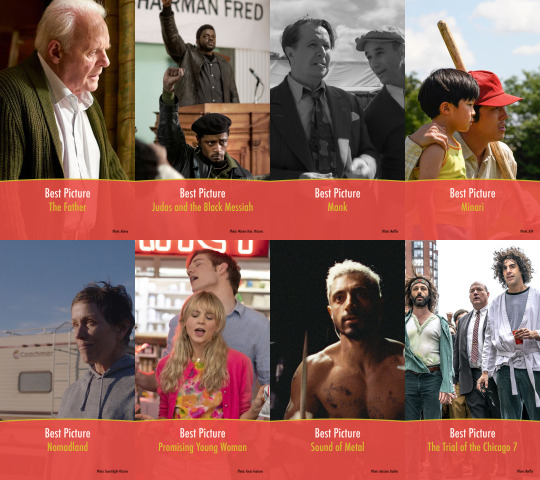
The Father (4,5)
Judas and the Black Messiah (4,5)
Mank (3,5)
Minari (4,5)
Nomadland (5,0)
Promising Young Woman (5,0)
Sound of Metal (4,5)
The Trial of the Chicago 7 (4,0)
The biggest of them all seems likely to be one of the most predictable of them all. Chloe Zhao’s Nomadland, which triumphantly transcends the boundaries between documentary and fiction, has taken home close to every major award possible. The story of Fran, who’s lost everything and embarks on a spiritual journey through the America of the modern day nomads, is an awe-inspiring achievement and will be a deserved winner. The only films that might have a slight chance of causing upset seems to be my personal favourite, Promising Young Woman, the wonderful Minari, that could continue the Korean triumph of last year, and Aaron Sorkin’s Oscar-bait ensemble hit, The Trial of the Chicago 7, which could end up as the Green Book of this year. It is amazing to see films such as The Father, Judas and the Black Messiah and Sound of Metal be acknowledged with this particular nomination, but I don’t see them winning. Mank seems like an easy film to like, but a hard film to love and as such, I don’t see it winning - especially taking the preferential ballot system into consideration. I would have loved to see Soul continue the tradition of nominating animated features for its beautiful take on life.
Who will win: Nomadland
Potential spoiler: The Trial of the Chicago 7
Personal favourite: Promising Young Woman
Should have been there: Soul
Actor in a Leading Role
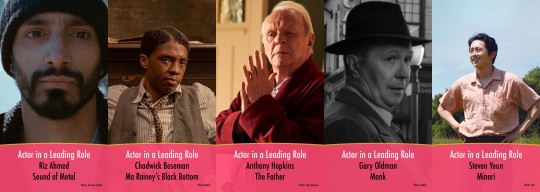
Riz Ahmed, Sound of Metal (4,5)
Chadwick Boseman, Ma Rainey’s Black Bottom (3,5)
Anthony Hopkins, The Father (4,5)
Gary Oldman, Mank (3,5)
Steven Yeun, Minari (4,5)
Chadwick Boseman is the only actor here, whose film is not nominated in the Best Picture race, but yet, he is the one on everyone’s lips before the big night. Sadly, this - of course - is partly due to his tragic and way to early death. The entire narrative surrounding his death and the fact that only he knew about the illness, while filming Ma Rainey, adds a truly tragic nuance to his powerhouse performance. To me, he does, however, balance on the edge of being too theatrical (goes for everything concerning that film) and it is mostly in his more subtle scenes that he surprised and impressed me the most. The performance of the year is undoubtedly Anthony Hopkins in The Father in my opinion; he manages to capture all the little nuances, confusions and frustrations of growing dementia. A truly ruthless performance! I also have tons of gratitude for Ahmed’s deeply moving and involving work in Sound of Metal, and Steven Yeun’s subtle performance in Minari. Gary Oldman is good as always in Mank, but yet, I see him as the one who could have been snubbed. I would have liked to see the likes of Delroy Lindo (Da 5 Bloods) or Mads Mikkelsen (Another Round) here.
Who will win: Chadwick Boseman
Potential spoiler: Anthony Hopkins
Personal favourite: Anthony Hopkins
Should have been there: Delroy Lindo/Mads Mikkelsen
Actor in a Supporting Role
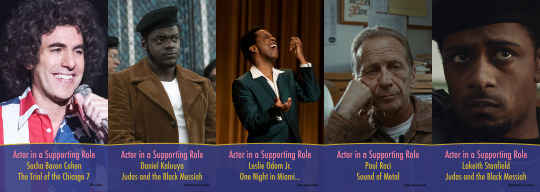
Sacha Baron Cohen, The Trial of the Chicago 7 (4,0)
Daniel Kaluuya, Judas and the Black Messiah (4,5)
Leslie Odom Jr., One Night in Miami… (4,0)
Paul Raci, Sound of Metal (4,5)
Lakeith Stanfield, Judas and the Black Messiah (4,5)
This one is Daniel Kaluuya’s to lose. And he will not be doing that. While you can argue that he might close to a leading role in Judas, but that does not take anything from his truly stunning performance. Such an interesting actor creating such an interesting character! His closest competitors seem to be Cohen for a role that hopefully can open up more dramatic chances for him and Paul Raci, who creates an endearing character in Sound of Metal. Oh, I would also love for him to win! Leslie Odom Jr. will probably have more open doors in Hollywood after his deserved nomination and Lakeith Stanfield will be asking himself how come he ends up as a supporting role for a film in which he was clearly the leading force of the story. His performance, however, is brilliant and impressed me further upon a recent rewatch of Judas. Could have been great to see Bo Burnham here for Promising Young Woman, but honestly I do not see who he should have replaced apart from Stanfield, who - as said - belongs in another category.
Who will win: Daniel Kaluuya
Potential spoiler: Sacha Baron Cohen
Personal Favourite: Daniel Kaluuya / Paul Raci
Could have been there: Bo Burnham
Actress in a Leading Role
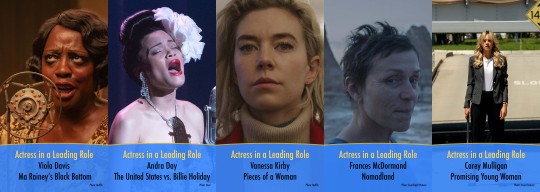
Viola Davis, Ma Rainey’s Black Bottom (3,5)
Andra Day, The United States vs. Billie Holiday (2,0)
Vanessa Kirby, Pieces of a Woman (3,5)
Frances McDormand, Nomadland (5,0)
Carey Mulligan, Promising Young Woman (5,0)
Perhaps the most unpredictable race of the evening! Everyone except Kirby has taken home a major award in the run-in to the Oscars. For that reason, I am having a hard time seeing Kirby take home the win for her otherwise stunning and powerful turn in mediocre Pieces of a Woman. Andra Day took home the Golden Globe, but I think the questionable quality (nicely put) of the film will make it hard for her to repeat that victory here. McDormand is beautifully subtle in Nomadland and could easily deserve the award, but the narrative is against her as she has already won two Oscars and took one just a couple of years ago. With this in mind, I think this is between Davis and Mulligan. Davis’ performance - not unlike Boseman’s in the same film - is close to being overdone, although it is a truly transformative performance. I will, however, say it should have been nominated as a supporting role. She took home the SAG and has a strong narrative for a win. Mulligan, in Promising Young Woman, is the best performance in my opinion and a minor favourite to win; she surprises with something completely new and risk-taking while still delivering the quality and nuance we have come to expect from her. A cheeky bid for who I would have liked to see, would be Jasna Duricic of Quo Vadis, Aida?, who I think carried that film on her shoulders with an intense performance.
Who will win: Carey Mulligan
Potential spoiler: Viola Davis
Personal favourite: Carey Mulligan
Could have been there: Jasna Duricic
Actress in a Supporting Role
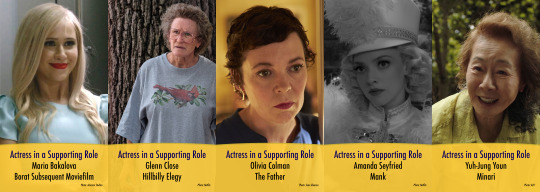
Maria Bakalova, Borat Subsequent Moviefilm (3,5)
Glenn Close, Hillbilly Elegy (1,5)
Oliva Colman, The Father (4,5)
Amanda Seyfried, Mank (3,5)
Yuh-Jung Youn, Minari (4,5)
For a long time, Seyfried seemed like the one to beat here with a lot of buzz before Mank was released. While her performance is delightful, her role is, however, extremely limited and I actually ended up being surprised she was even there on nomination morning. Colman and Close famously battled for the leading actress award two years ago with Colman surprisingly (yet, deservedly) taking home the award. That left Close Oscar-less still, but while the narrative might be with her, it would be a shame to give her the award for this performance in this film. Bakalova is the surprise: raunchy and ruthless, she is not only the rare comedic nomination, but also one of the most daring performances of the year. I would love for her to win, and should she win it will not just be because of THAT hotel room scene. Her turn in Borat is surprisingly funny and layered. I do - however - think that everyone has been as charmed by Youn as I have been. Her grandmother in Minari is the heart of the film and she creates one of the most memorable on-screen grandmothers in recent time. I would have loved to see Dominique Fishback from Judas, although her role was also quite small.
Who will win: Yuh-Jung Youn
Potential spoiler: Maria Bakalova / Glenn Close
Personal favourite: Yuh-Jung Youn
Should have been there: Dominique Fishback
Animated Feature Film
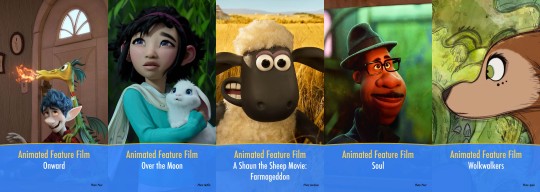
Onward (3,5)
Over the Moon (3,0)
A Shaun the Sheep Movie: Farmageddon (3,5)
Soul (4,5)
Wolfwalkers (4,0)
Soul is winning this one with no real competitor. It is an amazing film by Pixar - both storywise, philosophically and in particular technically. But it is also daring as it is close to being there first truly film MAINLY for adults. Pixar competes against themselves, as Onward is also here. Netflix joins the animation race with the charming Over the Moon, while Aardman Studios are here with Farmageddon, which is a simply delightful children’s film. Wolfwalkers is perhaps the most interesting when it comes to animation style as the handdrawn animation follows the emotions of the characters.
Who will win: Soul
Potential spoiler: Wolfwalkers
Personal favourite: Soul
Cinematography
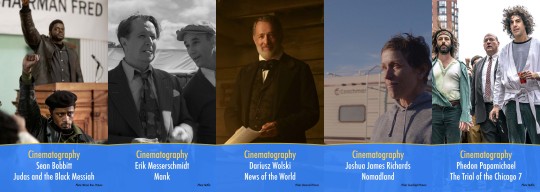
Sean Bobbitt, Judas and the Black Messiah (4,5)
Erik Messerschmidt, Mank (3,5)
Dariusz Wolski, News of the World (3,0)
Joshua James Richards, Nomadland (5,0)
Phedon Papamichael, The Trial of the Chicago 7 (4,0)
I was happy to see Judas being recognised here, but it hardly stands a chance, despite its great work with depth. The same can be said about Papamichael, whose nomination I honestly do not understand, and Wolski, who produces some stunning vistas in the otherwise disappointing News of the World. Messerschmidt’s black and white work on Mank is a joy to behold, and while the Academy typically love black and white cinematography, I only see it as a potential spoiler. Joshua James Richards manages the otherwise small Nomadland into a grand and stunning film with some of the most beautiful images that I cannot wait to enjoy in a cinema. I would have loved to see Hoyte van Hoytema be nominated for his work on the otherwise faulty Tenet.
Who will win: Nomadland
Potential spoiler: Mank
Personal favourite: Nomadland
Should have been there: Tenet
Costume Design
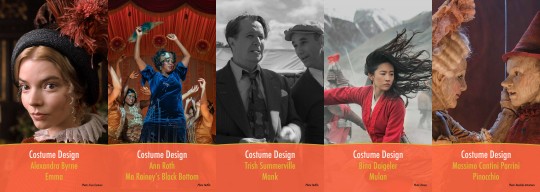
Emma (3,0)
Ma Rainey’s Black Bottom (3,5)
Mank (3,5)
Mulan (3,0)
Pinocchio (1,5)
This is Ma Rainey’s to lose with all of its broadway costumes. Personally I rate the costumes in both Pinocchio higher and I would have liked to see Promising Young Woman nominated, although I know how rarely contemporary nominees are in this category.
Who will win: Ma Rainey’s Black Bottom
Potential spoiler: Mank
Personal favourite: Pinocchio
Could have been there: Promising Young Woman
Directing
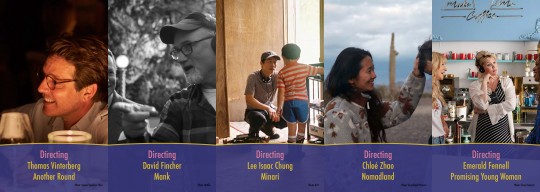
Thomas Vinterberg, Another Round (5,0)
David Fincher, Mank (3,5)
Lee Isaac Chung, Minari (4,5)
Chloé Zhao, Nomadland (5,0)
Emerald Fennell, Promising Young Woman (5,0)
It is a historic year for this category; the first time that two female directors are nominated in the same year. Chloé Zhao will also find her way into the history books as the only second female winner of the category for her work with Nomadland; a film which would never have existed without her. Fennell and Chung are her closest competitors, but despite their deeply personal and commited work they do not stand a chance. Mank is as Fincher as it gets, but the films is just not very good in the end. Finally, as a Dane, I am of course ecstatic to see Vinterberg here for his masterful work on Another Round. I would have loved to see Florian Zeller for The Father, though!
Who will win: Chloé Zhao
Potential spoiler: Lee Isaac Chung
Personal favourite: Chloé Zhao
Could have been there: Florian Zeller
Documentary (Feature)

Collective (4,5)
Crip Camp (4,0)
The Mole Agent (3,0)
My Octopus Teacher (4,0)
Time (5,0)
For a long time, Time or Collective seemed to be the ones to beat here. While Time, which I reckon to be one of the best, most impactful films of the year, remains my favourite, I think it might be too slow for some people. Collective shares the same issue as the entertaining The Mole Agent; they are in a foreign language. Thus, we end up with Crip Camp and My Octopus Teacher. The first is undoubtedly the most important of the two, but I do think that the heart-warming and surprisingly effective story of man and nature in Octopus Teacher will charm its way to a surprising Oscar! The fascinating micro-cosmos of American politics portrayed in Boys State was snubbed here!
Who will win: My Octopus Teacher
Potential spoiler: Crip Camp
Personal favourite: Time
Should have been there: Boys State
Documentary (Short Subject)
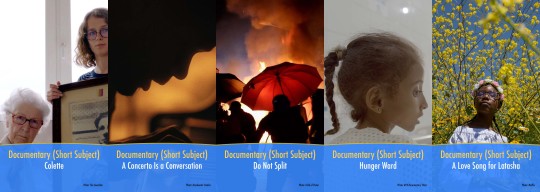
Colette (3,5)
A Concerto is a Conversation (3,5)
Do Not Split (4,5)
Hunger Ward (3,5)
A Love Song for Latasha (4,0)
Notoriously difficult to predict, this years documentary shorts are no exception. Four of them are mainly journalistic, with A Love Song for Latasha standing out with its artistic aspects. I think that will tip the votes in its favour.
Who will win: A Love Song for Latasha
Potential spoiler: A Concerto is a Conversation
Personal Favourite: Do Not Split
Film Editing
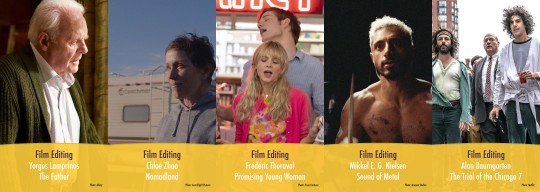
The Father (4,5)
Nomadland (5,0)
Promising Young Woman (5,0)
Sound of Metal (4,5)
The Trial of the Chicago 7 (4,0)
Traditionally the film featuring the most and the most clear cuts will take home this Oscar, making Trial the traditional favourite here. However, Mikkel E.G. Nielsen’s close collaboration with the sound designers of Sound of Metal seems to have pushed that film closer to a suprising yet deserved award. For me, however, the confusing, unstructured work of Yorgos Lamprinos in The Father is the best of the year. Mank would have liked to have this on nomination morning.
Who will win: Sound of Metal
Potential spoiler: The Trial of the Chicago 7
Personal favourite: The Father
International Feature Film
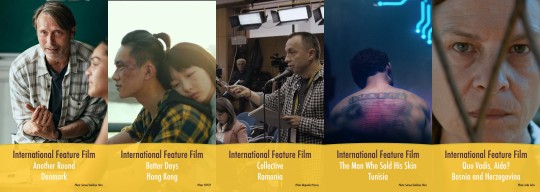
Another Round (5,0)
Better Days (3,5)
Collective (4,5)
The Man Who Sold His Skin (3,5)
Quo Vadis, Aida? (4,5)
Collective follows Honeyland’s example from last year with a double nomination for international and documentary, but it will not win despite its high quality. The Man Who Sold His Skin is an interesting and thought-provoking take on the refugee crisis and Better Days is a surprisingly effective YA adaptation with some criticism of the Chinese school system - they will be happy just be there. Quo Vadis, Aida? Is a really good film with a towering lead performance about one of the most gruesome historical events post WWII. However, and this is not just because I am Danish, Another Round will take this home. The film that grew from initially being a celebration of the Danish alcohol culture organically grew into a celebration of life in the shadows of a personal tragedy for director Vinterberg. At its heart is a beautiful performance from Mads Mikkelsen and a fascinating study of the Danish alcohol culture in the universally recognisable struggle of life. Its take on the built in paradox of our teenagers being stressed out in order to gain access to the same life that the film’s four protagonists desperately try to escape, is thought-provoking and well-portrayed.
Who will win: Another Round
Potential spoiler: Quo Vadis, Aida?
Personal favourite: Another Round
Makeup and Hairstyling
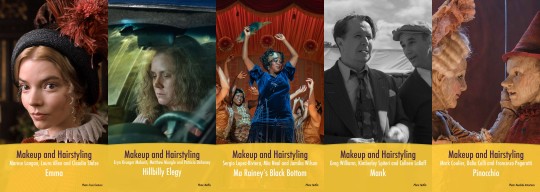
Emma (3,0)
Hillbilly Elegy (2,0)
Ma Rainey’s Black Bottom (3,5)
Mank (3,5)
Pinocchio (1,5)
Despite being a horrible film, the makeup and prosthetic work in Pinocchio ought to secure it an Oscar here. However, this will be given to the theatre makeup work in Ma Rainey.
Who will win: Ma Rainey’s Black Bottom
Potential spoiler: Hillbilly Elegy
Personal favourite: Pinocchio
Music (Original Score)
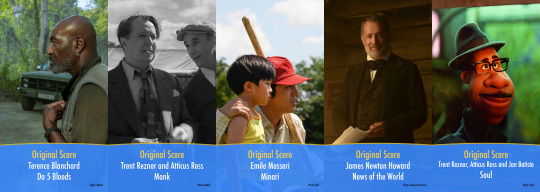
Da 5 Bloods (3,5)
Mank (3,5)
Minari (4,5)
News of the World (3,0)
Soul (4,5)
News of the World is a good yet classic western score, Da 5 Bloods is a nice score to listen to but does not fit in the film and Emile Mosseri’s brilliant score in Minari might be a bit too simple for some people. This means that this a battle between Trent Reznor and Atticus Ross and themselves for their buzzing 40’s score in Mank and amazing collaboration with Jon Batiste in Soul. Reznor and Ross will be taking the stage along with Batiste! It is close to robbery that Ludwig Göransson is not nominated for his towering Tenet score!!
Who will win: Soul
Potential spoiler: Mank
Personal favourite: Soul
Should have been there: Tenet
Music (Original Song)
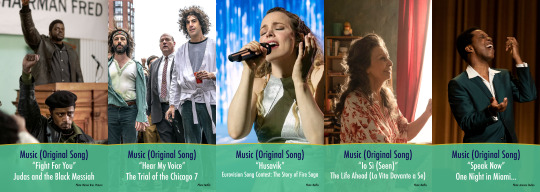
“Fight for You”, Judas and the Black Messiah (4,5)
“Hear My Voice”, The Trial of the Chicago 7 (4,0)
“Husavik”, Eurovision Song Contest: The Story of Fire Saga (3,0)
“Io Si (Seen”), The Life Ahead (3,0)
“Speak Now”, One Night in Miami… (4,0)
“Husavik” is a great song and is the only of the songs to truly play a part in the film rather than just being a credits song and I think that should always be a factor! However, this is Leslie Odom Jr.’s for the beautifully subtle “Speak Now” - he is an amazing singer! “Green” from Sound of Metal should have been here, I have to say.
Who will win: “Speak Now”
Potential spoiler: “Husavik”
Personal favourite: “Husavik”
Should have been there: “Green”
Production Design

The Father (4,5)
Ma Rainey’s Black Bottom (3,5)
Mank (3,5)
News of the World (3,0)
Tenet (3,0)
The wonderfully simple, yet effective production design of The Father really should be winning this. However, The Academy always love representations of Hollywood and - to be fair - the work in Mank is incredibly detailed and beautiful to look at. Honestly, I would have loved to see Emma - that film was one of the most beautiful of the year!
Who will win: Mank
Potential spoiler: The Father / Ma Rainey’s Black Bottom
Personal favourite: The Father
Could have been there: Emma
Short Film (Animation)
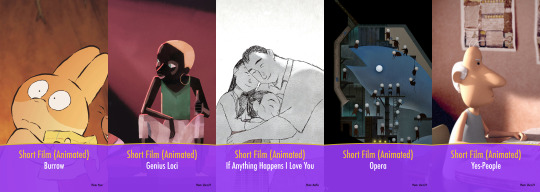
Burrow (4,0)
Genius Loci (3,0)
If Anything Happens I Love You (4,5)
Opera (5,0)
Yes-People (3,0)
Yes-People is funny but uninteresting. Genius Loci is visually fascinating but also very abstract. Burrow is classic Pixar charm. If Anything Happens I Love You is an emotional gut-punch. Opera is transcending the film media being more of an art installation rather than an actual shortfilm; it is however both visually and visionary in a league of its own. So obviously, it will not win. Disappointing not to see Out here!
Who will win: If Anything Happens I Love You
Potential spoiler: Burrow
Personal favourite: Opera
Should have been there: Out
Short Film (Live Action)
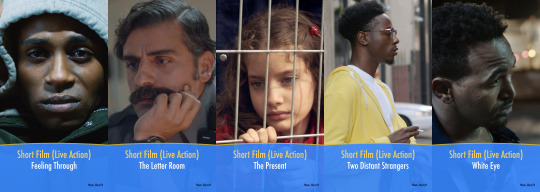
Feeling Through (4,0)
The Letter Room (3,5)
The Present (4,0)
Two Distant Strangers (2,0)
White Eye (3,0)
Two Distant Strangers seems like a late frontrunner here, and while it is impossible to disasgree with the importance of the film’s topic, I simply did not like the film. I found it both exploitative and overly symbolic leaving me with a bad taste in my mouth; difficult opinions to have regarding a film about such an important topic. None of the other four truly stand out, but I would love to see the inclusive and touching Feeling Through receive the Oscar.
Who will win: Two Distant Strangers
Potential spoiler: The Letter Room
Personal favourite: Feeling Through
Sound

Greyhound (2,0)
Mank (3,5)
News of the World (3,0)
Soul (4,5)
Sound of Metal (4,5)
Rarely has a film been so defined by its sound as Sound of Metal. It is not only groundbreaking but also deeply fascinating, impressive and involving; a main factor in the film’s success. It is difficult to predict as this is the first year the two awards (Editing/Mixing) have been combined. Greyhound might have been able to grab an editing award had they been separated still…
Who will win: Sound of Metal
Potential spoiler: Soul
Personal favourite: Sound of Metal
Visual Effects
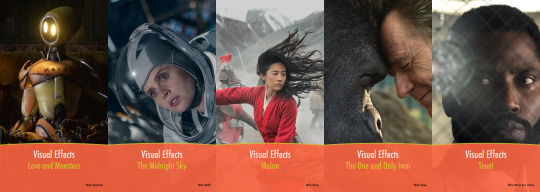
Love and Monsters (3,0)
The Midnight Sky (2,5)
Mulan (3,0)
The One and Only Ivan (3,0)
Tenet (3,0)
A category that would probably have been dominated by films such as Godzilla vs. Kong, Dune and Black Widow in a normal 2020, has now granted space for the charming animals of The One and Only Ivan and the surprisingly entertaining and heartfelt Love and Monsters. It does, however, seem like an obvious opportunity to give the supposed “saviour of cinema” Tenet one award.
Who will win: Tenet
Potential spoiler: The Midnight Sky
Personal favourite: Tenet
Should have been there: Soul
Writing (Adapted Screenplay)
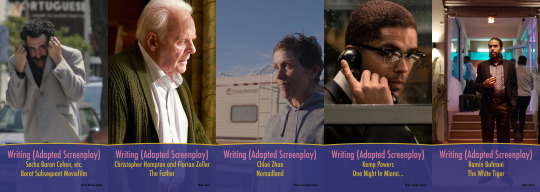
Borat Subsequent Moviefilm (3,5)
The Father (4,5)
Nomadland (5,0)
One Night in Miami… (4,0)
The White Tiger (3,0)
The White Tiger is the odd one out here with its overly told and clumsy voice-over, whereas Borat is another example of the weird definition. While the main character is not new, the film is obviously an original story. One Night in Miami… is a much better adaption than Ma Rainey, but The Father is even more successful in its journey from stage to silver screen. Zeller’s screenplay is masterful and daring in its ruthless depiction of dementia. However, it faces stern competition from Chloé Zhao who might add her first of many Oscars of the evening with this award for a rare adaptation of a non-fiction work into a fictional story.
Who will win: The Father
Potential spoiler: Nomadland
Personal favourite: The Father
Writing (Original Screenplay)
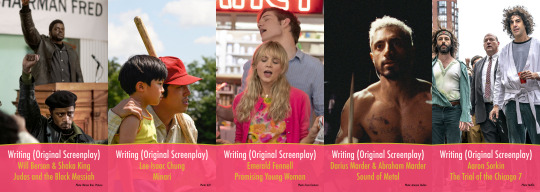
Judas and the Black Messiah (4,5)
Minari (4,5)
Promising Young Woman (5,0)
Sound of Metal (4,5)
The Trial of Chicago 7 (4,0)
I was immensely happy to see Judas and Sound of Metal here as they told well-structured and well-paced stories, while this was the biggest nail in the coffin for Mank as David Fincher’s father missed out on a nomination for the film about one of history’s best screenplays. The battle is seems to be between the king of screenplays Aaron Sorkin and a certain promising young woman, Emerald Fennell, who has written the best screenplay of the year in my opinion. Look out for Lee Isaac Chung as he will be ready to pounce with his deeply personal screenplay for Minari, should the battle between Fennell and Sorkin fall flat. The extremely charming and funny Palm Springs should have been here!
Who will win: Promising Young Woman
Potential spoiler: The Trial of the Chicago 7
Personal favourite: Promising Young Woman
Should have been there: Palm Springs
I wish everyone the best of Oscar nights! May the best films win!
#Oscars#Oscars 2021#Oscars Warm Up#My Oscar Predictions#Oscar Predictions#Academy Awards#Academy Awards Predictions#Nomadland#The Father#The Trial of The Chicago 7#Sound of Metal#Judas and the Black Messiah#Minari#Mank#Promising Young Woman
4 notes
·
View notes
Photo

A master’s lacking homage to a masterpiece
(Review of ‘Mank’)
*Warning: contains minor spoilers*
In recent years, Netflix have really upped their awards season contributions by giving either huge budgets, total creative freedom or a mix of these to some of Hollywood's biggest directors. In 2018 Alfonso Cuaron gave us his deeply personal and technically impressive 'Roma'. In 2019 we received Martin Scorsese's long and long-awaited epos 'The Irishman'. Both received 10 Oscar nominations, but both also struggled to invite their viewers fully onboard (The Irishman in particular). In 2020, Netflix is back with 'Mank'; this time giving David Fincher a platform to create a black-and-white love letter to screenwriter Herman J. Mankiewicz, the often overlooked writer of 'Citizen Kane'. 'Mank' has also received 10 Oscar nominations, but has Fincher learned from Cuaron and Scorsese by making a more inclusive film experience?
In the story we follow Howard, or simply Mank as he is mostly referred to, as he has been asked to write the screenplay for Orson Welles’ first film for studio RKO. Welles has received full creative control of his films and has head hunted Mank to be his writer. Mank - being trapped to his sickbed due to a car accident - is put under pressure by a strict time limit, his secretary Rita Alexander and Welles’ desire to keep Mank away from alcohol, to which he has succumbed for years. It is, however, through numerous flashbacks to Hollywood in the 30’s that we slowly unravel the true inspiration behind Mank’s now historic screenplay for ‘Citizen Kane’. Hollywood is - as the rest of America - suffering the consequences of the recession and the film studios are under pressure from decreasing ticket sales and the threat of a democrat (or socialist as they denounce him as) running for office in California. As hinted at here, ‘Mank’ tells stories of everything from the film industry and the process of writing a screenplay to politics, media and the blurred lines between these industries while adding some remarks on Hollywood’s male dominance along the way and plenty of easter eggs to ‘Citizen Kane’ itself. We rush back and forth between Mank’s writing process and the ghosts of his past, and it is definitely an advantage to either know quite a bit about this period of time or give the film a second watch to fully understand the details of the story.
As Herman J. Mankiewicz, Gary Oldman gives another transformative performance. Oldman is without a doubt an extremely talented actor, who it is always a pleasure to observe. As Mank he gives it everything he has as the drunken screenwriter who after having fallen from the stars suddenly end up producing his best work. His acting when Mank is at his most drunk, most uncontrollable is balancing just on the edge of feeling overdone, and I am having a hard time relating to him in these scenes. It is, however, in his more subtle scenes as when he realises the potential consequences of a quick remark about the power of the film industry in relation to politics or in his final conversations with people about his screenplay, that Oldman shines the brightest. Is it an Oscar-worthy performance, though? I’m not sure.
The other Oscar nominated performance is from Amanda Seyfried as the actress, Marion Davies, the mistress of media mogul William Hearst. Seyfried - as Oldman - gives everything and her character ends up being both more relatable and compelling than Oldman’s titular character. What she does is not overly showy, but she manages to create a character who is both seductive, funny and interesting, when it comes to her trying to find her place in the grand political and artistic puzzle that she has been caught in. The scene in which she refuses to help Mank, not necessarily because she disagress with what he’s asking, but simply to save her face, is in particular well-acted and saying for the character. Sadly, Seyfried is not given that many scenes or material to work with, and as such Davies remains a character that I would have loved to see more of and explore further.
In additional supporting roles, Lily Collins as Rita Alexander, Charles Dance as William Hearst and Arliss Howard as film producer Louis B. Mayer stand out the most. Lily Collins manages to give Oldman some competition in their scenes especially regarding Alexander’s missing husband, Ian. Not unlike Marion Davies, though, Alexander is never explored in depth. We get a much clearer idea of who William Hearst and Louis B. Mayer were. As Hearst, Charles Dance delivers an icy performance as the mighty media mogul, who unknowingly becomes the focus for Mank’s screenplay. Dance is always interesting and his turn as Hearst is no exception. Especially the scene in which he recites the parable of the organ grinder’s monkey is memorable and satisfying to watch. As Louis B. Mayer, Arliss Howard also gives an icy, yet more explosive, performance as a man in power. If I was a film producer who has worked with Fincher, I would probably look in the mirror an extra time after seeing Howard’s performance as Mayer. He - along with Fincher - creates a cynical and often two-faced character, who ultimately follows the money and influence despite preaching about the importance of his MGM family (only to ask them to half their wages in the following scene). As such Hearst and Mayer are used to portray the cynicism and moral corruption caused by money and power; a familiar topic for Fincher, who this time aims his cinematic weapons at his own industry.
Another guarantee from a Fincher film is his impeccable attention to detail and unapologetic perfectionism when it comes to the technical aspects of his films. And ‘Mank’ is no exception; above everything else it is a technical marvel. The vision to create the film as if it was made in the 40’s has been executed close to perfection. The black-and-white cinematography in 2.20:1 aspect ratio (wonder why they went for this rather than 1.33:1) is a feast for the eyes; the addition of reel-change circles as part of the “degrading” post-production of the visuals does feel rather gimmicky, however. I got the “old film” feel without that, but it is without a doubt a detail held dear by Fincher himself. I would have preferred to either not have them or for the film to have been shot on film, though. Especially since the production design is beautiful and manages to create a believable and buzzing Hollywood aesthetic, which didn’t need the additional digital ageing on top. The sound design works better, adding to the “old film” feel first of all because of the fact that it is in mono, but also due to it being deliberately recorded, mixed and toned to sound “old”. It feels less gimmicky than the visual aspects of the film. To round off the film’s sound is a close to perfect score by Trent Reznor and Atticus Ross, who once again proves their versatility by creating a playful score that oozes Hollywood in the 40’s.
Hollywood is also the main focus of the screenplay by David Fincher’s late father; a project close to the hearts of both father and son for years. But despite the endearing narrative of this aspect of the film, I cannot help but feel that the old Fincher’s script is one of the film’s main problems. It simply lacks focus and a structure that aids the story. The film is presented as the story behind the greatest screenplay of all time, but in reality it seems least interested in the screenwriting process. Of course, this holds a meaning too; about the different things influencing a screenplay, but instead it ends up standing on too many legs for it to be well balanced. The flashbacks do tell the overall story of Mank’s screenplay influences, but Fincher’s screenplay seems more interested in the politics, the film industry portrayal and the depiction of Mank’s inner demons. It never fully lands any of these plot lines to absolute satisfaction. The closest is the political story about the sudden invention of post-truth politics or “fake news”, which obviously is a comment to the current political climate. It features interesting thoughts on the ideas behind and consequences of this kind of political work, but it also distances me from the main plot, which is further sidelined by the - obviously deliberate, but questionable - lack of Orson Welles in the story. He is always in the periphery of the story, but never lands as anything but a caricature of the slightly arrogant wonder boy stripping our main hero from proper acknowledgement (for a long time).
Now, let's return to my opening question: is 'Mank' a more inclusive film experience than other Netflix awards season darlings such as 'Roma' or 'The Irishman'? Well… While 'Mank' has been the most entertaining of the three in my eyes, the regrettable conclusion must be a "no". Looking at the individual parts they are all exquisitely executed, apart from the disjointed screenplay, and the film is an immense pleasure to look at and listen to. Ultimately it is just less than the sum of all its individual parts. It has all the components to become a masterpiece, it just never weaves them into one. It is a party that we are never fully invited to. This does not mean that I do not applaud Fincher for sticking to his visions or Netflix for giving him creative freedom, I simply just wish they did not keep me at an arm's length throughout the 131 minutes.
3,5/5
#Film#Movie#Film Review#Movie Review#Oscars 2021#The Oscars#The Academy Awards#Oscars Warm Up#Mank#David Fincher#Gary Oldman#Amanda Seyfried#Lily Collins#Charles Dance#Arliss Howard#Atticus Ross#Trent Reznor#Best Picture#Best Actor in a Leading Role#Best Actress in a Supporting Role#Best Directing#Best Costume Design#Best Cinematography#Best Production Design#Best Makeup and Hairstyling#Best Sound#Best Original Score
3 notes
·
View notes
Photo
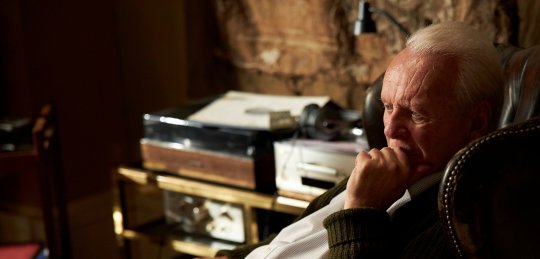
When all leaves are lost
(Review of ‘The Father’)
*Warning: contains minor spoilers*
Having just lost my grandmother, who suffered with increasing dementia throughout her last years, it was with a mix of excitement and grief that I pressed play on Florian Zeller’s ‘The Father’. Zeller has adapted his own play ‘Le Père’ from 2012. The language and location has been changed to English and London, and apparently this was because Zeller always has had his eyes set on Anthony Hopkins to play the lead in the film version. Seeing the film, you understand why; Hopkins is at the heart of this experimenting and brutally honest depiction of dementia and what this disease does to both loved ones and especially the person, who suffers from it. Add to that, that Zeller succeeds in what neither ‘Ma Rainey’s Black Bottom’ nor ‘One Night in Miami’ fully did: releasing itself from its theatrical ancestry and becoming a full-blown cinematic experience.
At this point in my reviews, I typically go through the main plot lines of the film, but that is neither easy nor meaningful when it comes to ‘The Father’. Florian Zeller uses Hopkins’ Anthony (named after the actor to underline Zeller’s determination to get him onboard) as an unreliable narrator. A narration style that can be both confusing and annoying but also compelling and fascinating. Here it ends up being both and I am absolutely certain that this is deliberate from Zeller, who uses the narration style to give us an experience of the frustrations, confusion and anxiety caused by dementia. Slightly spoiling the experience, I have to applaud Zeller for his daring choices of not only scrambling the order of the scenes but also switching the actors from scene to scene. At first it mainly frustrates as you struggle to realise what is going on and what is reality, but the deeper we get into the film (and, thus, into the mind and mental state of Anthony), it also broadens our perspectives and heightens the film experience.
This is - perhaps more than anything - thanks to a tour de force performance from the British veteran, Hopkins, who at the age of 83 feels more alive and better than ever. He infuses Anthony with life and a realism, which - having just experienced the disease intimately - was breathtaking in the word’s truest form. I have to admit that the range showed by Hopkins during the little more than 90 minutes shocked me. He manages to capture both the relieving moments of humour and gratitude, the sudden bursts of resentment and subtle, yet hurtful comments, and the vulnerability of losing track of every single aspect of your existence, with devastating precision and heart. While I am full of appreciation for Riz Ahmed’s work in ‘Sound of Metal’ and Chadwick Boseman’s in ‘Ma Rainey’ in particular, I have to say that Anthony Hopkins gives the performance of the year for me - without close competition. This is a master at work and it will be hard to find a better performance from Hopkins when looking back at his glorious filmography. He captivated me for 85 minutes before releasing me in the final minutes of the film, where I admittedly burst into tears not only moved by his heartbreaking performance but also as he had me reminiscing the last years with my grandmother.
The supporting cast is small (one remnant from its theatrical source) and confusing due to the fact that we are never really fully certain what their roles and relations to Anthony are. The one, who shines brightest is the ever so talented Olivia Colman as Anthony’s daughter, who despite caring immensely for her father is struggling with finding the surplus energy to keep looking after him. Colman always guarantees top quality acting and as Anne she makes no exception. Where she surprised Hollywood with her showy and over-the-top performance as Queen Anne in 2018′s ‘The Favourite’ securing her a well-deserved Oscar, she is much more quiet, subtle and timid here. She embodies the emotions of love, hurt and despondency as someone who can only observe the slow disappearance of a loved one. What she does here is the exact opposite of showy acting, but it is nonetheless of the highest order adding another perspective to Anthony’s disease and its influence on the people surrounding him. In further supporting roles Mark Gatiss and Rufus Sewell creates an appalling yet understandable male character who slides in and out of Anthony’s conscience, while Olivia Williams and especially Imogen Poots as Anthony’s newest helper adds further emotional power to the story.
One of the main reasons why Zeller succeeds so well in transforming his play into a cinematic experience is the masterful production design. While limited to more or less one location, the art directors and set designers have managed to create a clever, intricate labyrinth constantly changing the layout and interior design of the flat. This stroke of genius not only creates an interesting visual experience but also adds to the confusion caused by the unreliable narrator. The cinematography and editing also play important parts in this process by framing the locations in the same ways and structuring the chaotic story line respectively. I reckon that the technical aspects of the film will be overshadowed by both other films and the majestic nature of Hopkins’ performance, but with a less imaginative production design, a less observing cinematography and a less daring editing style, I am positive that the theatricality of the film would have taken something away from the experience.
At the helm of it all stands Florian Zeller, who not only debuts as a film director but also as a feature film screenplay writer. His vision is both clear and daring, and I have to applaud the way in which he manages to create a film that respects both its subject and his loved ones equally. It would have been easy to end up with an unlikeable lead due to the often unfiltered and biting nature of people suffering from dementia. Instead, Zeller opens up Anthony’s world and invites us inside by frustrating and confusing us as viewers. Not to fully grasp the incomprehensible but to give us a glimpse of it, a realisation of the many emotions of losing touch with where you are, what things are and ultimately who you are yourself. Thus, revealing the powerlessness felt by everyone affected by dementia either personally or through a loved one. Here are no easy solutions, no short cuts and no Hollywood ending. Instead we are given a ruthless film about a ruthless disease.
4,5/5
#Film#Movie#Film Review#Movie Review#The Oscars#The Academy Awards#Oscars 2021#Oscars Warm Up#The Father#Florian Zeller#Anthony Hopkins#Olivia Colman#Mark Gatiss#Imogen Poots#Rufus Sewell#Olivia Williams#Best Picture#Best Actor in a Leading Role#Best Actress in a Supporting Role#Best Film Editing#Best Production Design#Best Adapted Screenplay
17 notes
·
View notes
Photo
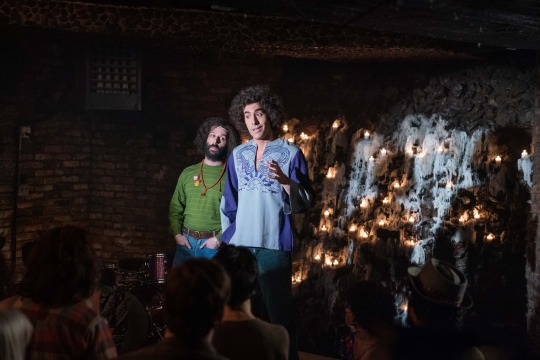
Politically impotent, but highly entertaining courtroom drama
(Review of ‘Trial of the Chicago 7’)
*Warning: contains minor spoilers*
To say that the autumn release of Aaron Sorkin’s ‘The Trial of the Chicago 7’ felt timely following a summer of numerous instances of police brutality against peaceful #BlackLivesMatter protesters would be an understatement. To say that Sorkin’s high speed courtroom drama is revolutionary in any way whether as a film or a contribution to a political debate would - on the other hand - be a serious overstatement. From the sharply constructed and fast paced opening sequence where all our main characters are introduced with fast editing, upbeat music and brilliantly written shifting dialogue, Sorkin’s main mission (or ultimate fate) is clear: ‘Trial’ should above all be entertaining filmmaking.
Its story does not seem as the obvious fit for an entertaining story, however. In the shadows of the Vietnam War’s growing number of fatalities, various protest groups plan to come to Chicago in 1968 for the Democratic Party Convention to voice their contempt towards the US’ involvement in the war and the military service procedures. The protests, however, end in violent confrontations with the Chicago police. In the aftermath of these confrontations the leaders of the different protest groups are prosecuted for inciting riot and breaking various other laws. It is the battle between the Nixon administration and their oppositions represented by Students for a Democratic Society, the Yippies, several smaller figures and for some reason Bobby Seale and the Black Panthers (actually making it the Chicago 8), although they did not take part in the protests. The film follows their trial at the hands of eccentric and controversial Judge Hoffman combined with flashbacks to the events of the protest.
The film won the SAG ensemble award and that stands perhaps as one of the single least surprising awards of this awards season. ‘Trial’ is - as hinted at by the title - an ensemble piece if there ever was one. The film has no real lead, although Eddie Redmayne as Tom Hayden (SDS), Sacha Baron Cohen as Abbie Hoffman (Yippies) and Joseph Gordon-Levitt as Richard Shultz (Prosecutor) might be at the centre of attention. All involved actors have clearly had a good time with their roles portraying them with great enthusiasm, but for most parts also some degree of limitations.
Redmayne’s Hayden is the typical “good guy” who forgets to stay seated when the group protests the judge and continues to argue with Abbie about their political opinions and especially the manner in which they want them implemented. Redmayne does a decent job, but Hayden never really unfolds as a fully fleshed character to me. I do not feel that Redmayne ever really becomes his character and that is main reason why I never fully connected with him. Baron Cohen has run away with most attention for his portrayal of Abbie Hoffman, which I think partially is down to the fact that he is a somewhat unusually dramatic role for the Borat-actor. Cohen is without a doubt a better actor than he might be acknowledged as, and Abbie allows him a chance to show that. It is, however, still in combination with his classical sarcasm and wit that Cohen fully succeeds with his character. Through a returning stand-up routine throughout the film, Cohen’s Hoffman functions in some ways as a narrator and might be the closest we get to a leading role. He also gets to deliver the most touching lines of dialogue in my opinion as he takes the chair towards the end. Finally Gordon-Levitt tries his best to convey the mixed emotions and increasing doubt as Schultz faces the choice between blind loyalty and his devotion to the law. While I always love to see Gordon-Levitt on the screen, I cannot help but feel that Schultz as a character feels highly constructed and I had a hard time believing him to be that sympathetic towards the Chicago 7.
In many ways, I found Mark Strong as Jerry Rubin, John Carroll Lynch as Dave Dellinger and Mark Rylance as the defendants’ attorney, William Kunstler, to be more fascinating characters than both Hayden and Schultz in particular. Mark Strong continues to be more and more interesting and his Jerry Rubin is easily the most enjoyable character along with Cohen’s Hoffman. Strong, too, manages to balance the vulnerability of the sometimes blue-eyed Yippies with their sarcastic distancing and humour-driven protests in the courtroom. I actually believed in his character, when both the protests and the juridical proceedings become too overwhelming for him and he snaps in various ways. Carroll Lynch is an almost criminally underused actor and here I, too, would have liked to explore his character more as he feels so different from the remaining defendants. With the limited material he gets, he manages to create a sympathetic character. The same can be said about Rylance, who uses all of his theatricality as be battles with Frank Langella’s overdone Judge Hoffman. Langella gives it everything and then some to make Hoffman as unscrupulous, derailed and amoral as possible, which ultimately cooled my resentment towards him. He ended up feeling like a caricature more than an actual character and for that, way less scarier.
How come - despite all the characters’ flaws and limitations - that the film is still entertaining, then? Well, the main answer is Aaron Sorkin. While he is still to fully proof himself as a director (Molly’s Game also had some issues), he still is one hell of a writer. You can accuse him (rightly so) of over-writing his stuff, taking to many freedoms with his source material and balancing on the edge of using too much pathos, but it is hard to resist his razor sharp dialogues and tongue-in-cheek one-liners. He is no stranger to courtroom dramas and it is clear that he is on home-turf with all of these juridical and political exchanges of beliefs. For this reason, alone, ‘Trial’ never feels dull or slow. Additionally, this is aided by an often fast-paced editing and the fact, that it never dwells to long on one point before moving on to the next.
This, however, also stands as the main reason as to why the film never feels anything other than impotent as a political work. It never gets too dangerous or too controversial. It gets most dangerous, when it comes to the inclusion and portrayal of Bobby Seale and the Black Panthers. As Seale, extremely talented Yahya Abdul-Mateen II, is highly forgettable mainly down to the fact that Seale is reduced to a prop in the overall story. During the film, the court is accused of including Seale in the trial in order to scare the jury with a black man; adding a layer of racial injustice to the story. But in reality, it also feels as if Seale’s story line has been added to the film to “tick off” the race box; Fred Hampton is also thrown in there as Seale’s legal counsellor with his untimely death just briefly touched upon. The story of Seale, Hampton and the Panthers deserve more time, more attention and more gravity than given here; an initial opinion of mine that was only made clearer after watching ‘Judas and the Black Messiah’.
Ultimately, ‘The Trial of the Chicago 7’ is a highly flawed film and as a political work it stands as oddly harmless and undaring considering its timing and topic. However, thanks to another fast paced and sharp script by Aaron Sorkin, inspired performances from its all-star ensemble lead by Baron Cohen and Jeremy Strong and interesting plot it ends up as a highly entertaining courtroom film. A well-looking, satisfying meal, although it does not last for too long and leaves a somewhat questionable taste in the very back of my mouth.
4/5
#Film#Movie#Film Review#Movie Review#The Oscars#Oscars 2021#Oscars Warm Up#The Trial of the Chicago 7#Aaron Sorkin#Sacha Baron Cohen#Abbie Hoffman#Eddie Redmayne#Tom Hayden#Joseph Gordon-Levitt#Richard Schultz#Jeremy Strong#Jerry Rubin#John Carroll Lynch#Mark Rylance#William Kunstler#Frank Langella#Judge Hoffman#Yahya Abdul Mateen II#Bobby Seale#Best Picture#Best Actor in a Supporting Role#Best Cinematography#Best Film Editing#Best Original Song#Dave Dellinger
12 notes
·
View notes
Photo
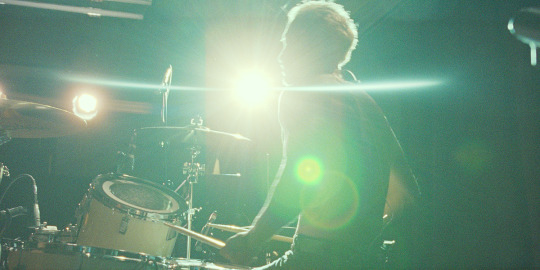
The power of stillness
(Review of ‘Sound of Metal’)
*Warning: contains minor spoilers*
“The world does keep moving, and it can be a damn cruel place.
But for me, those moments of stillness, that place, that's the kingdom of God.”
- Joe (Paul Raci)
What is an addiction? That is in many ways one of the central questions asked by ‘Sound of Metal’, the six time Academy Award nominated feature film debut by Darius Marder. On the surface the film seems like a tale as old as time with a protagonist who all of a sudden loses the ability to do what defines him. This storyline is the recipe for a classic tale: the athlete who suffers a career-ending injury, the surgeon who loses his fine motor skills or in the case of ‘Sound of Metal’, a heavy-metal drummer who loses his hearing. But what makes ‘Sound of Metal’ reach above the bar of this recipe - apart from a stunning technical side - is the fact that it is not as much about losing an ability as it is about facing an addiction. It is in this personal discovery for our main character, Ruben, that the film proves itself deserving of its six Oscar nominations.
As described, we follow Ruben, who is the drummer of a heavy metal band in which his girlfriend through four years, Lou, is the lead singer. However, during a tour, he is suddenly faced with a deteriorating ability to hear. Initially showing itself as a tinitus-like sound, which quickly develops into a deep, humming “lack of sound” making it impossible for Ruben to not only play his drums but simply to keep a conversation. As he is presented with the cold facts that the hearing already lost will never return, he is spiralled towards a tumultuous past of drug addiction. As Lou becomes worried for him she helps set up a meeting - through Ruben’s sponsor - with Joe, who leads a support group for addicts with hearing loss as part of a much larger deaf community. Ruben’s stay with the group is equally conflicting and eye-opening as he is forced apart from Lou, faced with the consequences of his hearing loss and presented with new opportunities under the firm but endearing leadership of Joe.
As Ruben, Riz Ahmed delivers a career-best turn moving himself further up the Hollywood food chain. It is an extremely nuanced and touching performance. One moment he burns through the screen with a powerful and/or frustrated presence only to almost hide himself in the next sequence as he gives space to Ruben’s vulnerability and inability to fully accept his new reality. Ahmed embodies all these feelings close to perfection and it is topped off by an authenticity in his performance and chemistry with the film’s many deaf actors that underlines his dedication to Ruben’s character arc. Ahmed spent a lot of time in the lead-in to the production within the deaf community and it pays off as Ruben’s growing acceptance of and inclusion in said community feels immensely real.
At the centre of the film’s heartfelt portrayal of the deaf community stands Paul Raci, however. He creates one of the most endearing characters of the year as Joe, a Vietnam War veteran (where he lost his hearing) and former alcoholic, who now hosts the support group for hearing impaired former addicts. Raci brings the role a natural authenticity as he himself is no stranger to the American deaf community as the child of two deaf parents. He clearly uses this to create a fully fleshed character, who you come to both care for and respect. Because, make no mistake, as heart-warming as many of Joe’s scenes are, he is also at the centre of one of the film’s most heart-breaking scenes towards the end, in which he gives a profound and touching message to a desperate Ruben. Raci plays this scene with such heart and presence that Joe’s emotional reaction towards the end of it feels as if it was Raci’s own reaction to the scene. A stunning performance that would and should have earned Raci many more awards had it not been for a certain Daniel Kaluuya.
As Lou, Olivia Cooke is somewhat sidelined half way through the story, and knowing that the Marder brothers did write her story in full detail, I would have loved to see more of it and discover how she dealt with her own addiction(s). Admittedly, I guess that would have been at the cost of the film’s quite tight focus, but the main reason I wanted to see more of her story, is that Cooke manages to create a fascinating character with the limited screen presence she gets. Her scenes with Ahmed as their characters try to realise the extent of Ruben’s hearing loss both individually and as a couple are simply heartbreaking. Most of the film’s remaining supporting cast were found in the deaf community and it - once again - helps heightening the film’s anchor in reality. To highlight a few, Lauren Ridloff brings charm to a teacher in the deaf community school, Chelsea Lee brings life and heart to one of Ruben’s new-found friends and Jeremy Stone, who also worked as Ahmed’s personal ASL teacher and Marder’s creative assistent on the film, features in a specifically memorable scene as an - surprise - ASL teacher.
This desire to include the deaf community as not only a focus point of the film, but as an active part of the production is a clever and brilliant move by director, Darius Marder. Not unlike the nomads in Nomadland, it creates a certain sense of some of it being close to documentary, although ‘Sound of Metal’ is much clearer in being a work of fiction. It is obvious that the story is deeply personal to the Marder brothers who co-wrote the script on from an original story by Derek Cianfrance (‘Blue Valentine’, ‘Place Beyond the Pines’) with the film being dedicated to their grandmother who went deaf herself. One of many personal touches is the choice to open caption the film, which - of course - can be seen as a statement to make more films accessible for the deaf community, but it also heightens the film’s creative vision to put the viewer in the shoes - or rather ears - of Ruben.
The main reason why this works, however, is the film’s absolute strongest asset: the daring creative choice to create a (with Marder’s own words) Point of Hearing (PoH) experience. Years of work has been put into the film’s work with its sound and how it connects with its imagery. In many situations the way they try to portray the sensation of deafness could have felt gimmicky and, thus, fallen flat. It doesn’t, however. From the first scene in which we experience Ruben’s auditory sensations, I bought it all the way and it truly heightened the film experience. An experience I would love to have in a cinema. It works thanks to the immaculate work by the Marder brothers in their script, the intimate cinematography by Daniël Bouquet and most of all the collaboration between Danish editor Mikkel E.G. Nielsen and the sound department under the leadership of supervising sound editor Nicolas Becker. The way they first create some of the best concert footage of recent years (featuring only live performances by Ahmed and Cooke) and then one of the best realised depictions of a sensation so many of us never have had or will have is awe-inspiring.
Ultimately, ‘Sound of Metal’ is just as much a film about facing your past and your ideas for the future as it is about a deaf drummer learning to live his new life. As such it features some the same thematic questions as other films of the year (‘Soul’ and ‘Another Round’ to name just two): what drives and what should drive your life. What is purpose, what is a meaningful life? As the quote in the beginning of this review hints at, life has a cruel tendency to roll on no matter where you are in your life.
For Ruben, his journey reveals that while distancing himself from his drug addiction he might just have moved on to a new addiction: an addiction to sound and the world that sound opened up for him. The world of Lou, the world of love, the world of purpose. In a telling scene after Ruben has made a life-changing decision, a clearly hurt Joe calmly says to Ruben that he sounds like an addict. And he does. Ahmed delivers this scene with such necessity, such desperation and inconstancy that we feel his addiction to sound, to hearing. The following and final 30 minutes of the film end up being both hurtful and hauntingly beautiful as Ruben comes to terms with his addiction in a realistic and satisfying way. The final scene is up there with the best of the year; you can literally hear it and feel. The power of stillness.
4,5/5
#Movie Review#Film Review#Film#Oscars 2021#Academy Awards#Oscars Warm Up#Sound of Metal#Riz Ahmed#Paul Raci#Olivia Cooke#Lauren Ridloff#Chelsea Lee#Jeremy Stone#Darius Marder#Abraham Marder#Derek Cianfrance#Point of Hearing#PoH#Daniël Bouquet#Mikkel E.G. Nielsen#Nicolas Becker#Best Picture#Best Actor in a Leading Role#Best Actor in a Supporting Role#Best Film Editing#Best Sound#Best Original Screenplay
2 notes
·
View notes
Photo

Can you guess what every woman's worst nightmare is?
(Review of ‘Promising Young Woman’)
*Warning: contains minor spoilers*
With the murder of Sarah Everard in London and the subsequent worldwide focus on what’s been a reality for women for centuries (not being safe neither at home nor in public) Emerald Fennell’s ‘Promising Young Woman’ seems even more timely than it already did on my first watch in January. Fennell’s highly entertaining, incisive criticism of the patriarchy hit even harder here on the second watch, and the film might end up being seen as one of the best depictions of a global issue that hopefully is nearing its end. But is that a naive wish after centuries of status quo? That’s the question you are left with in these days and the question that Fennell asks us all in her tale of Cassandra Thomas.
The film kicks off with the thrusting hips of a dozen of regular office guys on the dance floor, as the DROELOE remix of the song ‘Boys’ plays. Three guys discover a seemingly dead drunk woman sitting all by herself, “basically asking for it” as one of the guys remark with the film’s first of many hints to the general victim blaming surrounding sexual assaults. The “nice guy” of the group walks over and takes the woman home, but nothing is quite as it seems…
The woman, Cassandra Thomas (or simply Cassie), is our main protagonist, who is clearly on a mission to “teach” the seemingly nice guys of the night life some lessons, but why? She suffers from a personal trauma, which is slowly unravelled as we follow the parallel stories of her revenge mission and a budding romance with former classmate from med school, Ryan. As Cassie’s life slowly seems to be getting back on track, the underlying trauma slowly starts to be revealed leaving us as viewers with a hilarious, thought-provoking, hard-hitting and shocking ride.
Our driver on this ride is Carey Mulligan, who as Cassie embodies all the troubled emotions of a hurt woman dealing with an overwhelming cocktail of suppressed guilt, missed opportunities in life, struggles with allowing herself to feel affection, and the constant reminders of the world in which the trauma, that has led her here, happens over and over again. Mulligan manages to juggle all of these emotions close to perfection in a jaw-dropping performance. She is almost present in every single scene and she makes you feel something in each scene, whether it is sorrow, sympathy, indignation, happiness, relief or something else. One moment you laugh at her acid sarcasm only to either be moved by her vulnerability or taken aback by her commanding and terrifying presence. A true shape-shifting performance from Mulligan that hopefully gives her a well-deserved Academy Award at next month’s Oscars ceremony.
Opposite of Mulligan, Bo Burnham delivers a surprisingly good performance as Ryan, the paediatrician, who - despite his immense awkwardness - manages to form a romantic connection with Cassie. He delivers all the funny one-liners and comedic timing that you would expect from him if you have seen his stand-up comedy, but it is in the less comedic scenes that he really surprised me. As the boyfriend unknowingly caught in a spider’s web, while hiding his own skeletons, he gets to show new sides to his acting. The relationship between Ryan and Cassie becomes extremely believable thanks to the performances from Mulligan and Burnham and who would have known that a Paris Hilton song (‘Stars Are Blind’) would end up as the soundtrack for one of the most endearing (and hard-hitting on a rewatch) romantic scenes of the year? I certainly didn’t!
In other supporting roles, I especially want to highlight Laverne Cox as Cassie’s very forward, yet caring boss serving some hilarious lines throughout the film and Alfred Molina as a troubled, repentant lawyer, who completely steals the one scene (apart from one tiny frame later on) he features in. In Molina’s scene he heightens the reality of Cassie’s character and her mission as he does not act according to what she’s planned or gotten used to. The chemistry between Mulligan and Molina is electric. Finally, Jennifer Coolidge and Clancy Brown deserves praise for their portrayals of Cassie’s parents, who struggles to find the right way of supporting their ‘lost’ daughter, while Molly Shannon, Max Greenfield and Chris Lowell all create interesting characters in the second part of the story.
The characters are extremely well-performed, but they are also extremely well-written. Emerald Fennell, known for her acting in ‘The Crown’ and her writing with ‘Killing Eve’, has written an amazing first-time script, which manages to present a compelling story, that oozes both realism and absurdity, comedy and tragedy, satire and hard-hitting emotions. It is impressive how she manages to make every aspect work on their own; it’s even more impressive how they end up making each other stronger and more telling. The dialogue is witty and razor-sharp, and Fennell dares to take some drastic and brave decisions that turn an otherwise well-known genre (the revenge story) on its head several times. In my eyes Fennell has created the best original script and story of the year!
Technically, Fennell clearly has a crystal-clear vision with the film. The visual aspect is as if it has been covered in cotton candy - most clearly shown in Cassie’s home - which stands in great contrast to the gravity of its topic. But the film and story finds a strength in this contrast as it mimics the often constructed “innocence” of women, I would say. Throughout this review, so far, I have mentioned the songs that play a clear and influential part in Fennell’s storytelling, whether it is Hilton’s love song, a spine-tingling classical orchestration of Britney Spears’ ‘Toxic’, or Juice Newton’s ‘Angel of the Morning’ to just name three, they heighten the experience as part of one of the best contemporary soundtracks of the year.
‘Promising Young Woman’ will not be liked by everyone; and Fennell doesn’t want it to be either. It is an exposé - not just of the patriarchy and rape culture but perhaps even more so of the silence that often meets said culture from its surroundings. Much like Jordan Peele’s ‘Get Out’ revealed the racism of the so-called colour-blind, who would vote for Obama a third time if they could, Fennell’s ‘Promising Young Woman’ reveals the sexism and entitlement of the so-called “good guys” who “were just kids” or misbehaved during “different times”. Times up, guys and girls! With a highly controversial (but in my eyes extremely poignant) ending, a powerhouse performance from Carey Mulligan, a highly entertaining script and an electric soundtrack, Emerald Fennell has made one hell of a feature film debut!
5/5
#Film Review#Movie Review#Oscars 2021#Oscars Warm Up#Promising Young Woman#Emerald Fennell#Carey Mulligan#Bo Burnham#Laverne Cox#Alfred Molina#Jennifer Coolidge#Clancy Brown#Molly Shannon#Max Greenfield#Chris Lowell#Best Picture#Best Director#Best Actress in a Leading Role#Best Writing (Original Screenplay)#Best Film Editing#Times Up#MeToo#sexism
31 notes
·
View notes
Photo

Home is much more than a word
(Review of ‘Nomadland’ by Chloé Zhao)
*Warning: Contains minor spoilers*
The 2008 financial crisis has lead to many films among which quite a few are actually very memorable for their portrayal of the absurdity of the crisis’ background and mechanisms (think ‘The Big Short’, ‘Margin Call’ and ‘Inside Job’.). But apart from a few, smaller scenes in ‘The Big Short’ the films have all focused on the “bad guys” and not the everyday American. Until now. Because we have never seen a portrayal of the flipside of the 2008 recession quite like Chloé Zhao’s ‘Nomadland’. Actually, we have never seen a film quite like ‘Nomadland’ if I dare say so. Picking up six Academy Award Nominations being favourite to take home at least half of these, ‘Nomadland’ is the talk of the town in the awards season right now for all the right reasons. But this is a film that deserves and demands a much broader perspective than simply picking up awards accolades.
Being adapted from the non-fiction book (of the same name) by Jessica Bruder, ‘Nomadland’ tells the fictional story of widower Fern. Her late partner Bo worked in the mine at US Gypsum’s facility in Empire, Nevada. But when we meet her everything has been taken away from her; her husband has died and during the recession a decreasing demand for sheetrock ultimately resulted in US Gypsum not only closing their facility but also terminating all company housing before closing the entire zip code. Desperate to cling on to the life that once was (driven by her father’s saying, ‘What’s remembered lives’) Fern stays in Empire living in her van. This places her on the path of America’s modern day nomads, who live in their vans while moving across country during the year to pick up work of very varied kinds (working in an Amazon warehouse in the run up to Christmas, sorting rocks, flipping burgers and looking after camp sites to name a few). In the span of a year we follow the fictional character of Fern as she embarks on a journey through western US making friendships, spiritual connections and unique bonds with real-life nomads on the way.
And this is where ‘Nomadland’ becomes unlike anything I have seen. Because it is not a documentary but it also doesn’t fall into the docudrama genre; it’s somewhere in between mixed with a fictional narrative. Fern’s fictional story becomes a living, breathing part of the lives of the real nomads we meet and come to admire and care for. The boundaries between Fern’s fictional character and everything else are never clear and this makes for a deeply moving, thought-provoking and quite spiritual experience that at times felt almost meditative.
This setup only succeeds because of the visions and meticulous attention to detail from writer, director, producer and editor Chloé Zhao (nominated and hailed for all four aspects of her work). When she was led in the direction of Bruder’s book (by Frances McDormand who had bought the film rights), Zhao departed on her own journey on the road with partner and the film’s cinematographer, Joshua James Richards, to experience the lives of the nomads. This is where she initially met many of the nomads who end up playing pivotal parts in her narrative and heard the many stories of their lives and life philosophies. These stories are at the centre of a particularly touching scene around a fire as they share stories of lost jobs, mortgage loans, deaths of loved ones or terminal illness. This could point to the film being a depressive and somewhat sombre look at the many human fates in the shadows of the recession. That is, however, not the case. While the film obviously pinpoints the horrifying truth that many hard-working Americans still struggle to make enough money for a living, this is in no way the film’s main focus. Instead we get to see the joy, the community and the resilience that these people find in the midst of all the many struggles and challenges that life has thrown their way. As such ‘Nomadland’ becomes both an inspiring and beautiful tale.
As Fern, Frances McDormand is the film’s heart; she is as endearing as she is resilient as she adjusts to life on the road. McDormand is one of the finest actors around and it is difficult to imagine anyone else in this role. It says everything about her performance and commitment to the part, that Bob Wells (YouTube Star and nomad spiritual guide), who stars as himself, apparently didn’t realise she was an actor before after their scenes. This is a testament to McDormand’s humble way of engaging with the film’s non-actors. It feels real, it feels naturalistic and it feels sincere, and I actually think that it feels so, because it is so. And as such, McDormand’s acting is unlike anything I have seen before too. You get the feeling that she (as Fern) simply build relations with these people as equals; their dialogues feel real and, thus, their emotional connection becomes real too. David Strathairn is the film’s only other professional actor as the character, Dave, who plays a part in the second development in Fern’s character (apart from familiarising with nomad life): moving on from Bo without letting go of what was. Their chemistry is very natural and Strathairn could easily have come across as yet another “real character” if you were not paying attention. The way their relation develops is refreshing and very telling.
The film, however, belongs to the titular characters of the nomads of modern America. It would be wrong to say that they give good performances, because they do not perform; they simply are. Instead I will call them interesting and inspirational human beings. Among the many people we meet, I would like to highlight three: Linda May, Swankie and Derek. Each representing three different aspects of nomad lives, they each feature in three of the scenes that have really stayed with me. Linda May becomes Fern’s guide and confidant when introduced to the nomad life and you quickly come to care for her and as such her story of hitting rock bottom strikes really hard. Swankie is a powerhouse with whom Fern shares quite a few scenes that causes both laughs and pensiveness. When Swankie in a quiet moment with Fern tells an uplifting story of how good a life she has had despite all the hardship she has seen, it is one of the finest scenes of the year. In the scene, that Fern shares with Derek, a young man who she met briefly in an early scene, it is something completely different; Derek’s story inspires Fern to recite Shakespeare’s 18th Sonnet: “Shall I compare thee to a summer’s day?”.
A scene and recitation that is complemented by simply stunning magic-hour imagery by Richards, who throughout the film manages to not only capture the magic and tranquility of the western US but also the ‘endlessness’ that lies in these rocky, sandy surroundings. But his work in the human-centred scenes are not to be overlooked either. He manages to put us as viewers right in the middle of the relations, the conversations and the solitude of the vans. As such we get to explore this life by ourselves and I hope with all of my film-loving heart that I will get the opportunity to see this film on the big screen, because that’s really where it belongs. The sound work supports Richards’ mission and the exquisite music by Ludovico Einaudi heightens his panning compositions of the landscapes.
In the end we have to return to Chloé Zhao, though, because no Zhao, no ‘Nomadland’. She adapted Bruder’s story for the screen, she directed the two actors and allowed the real life people to simply be and she edited it all. It is Zhao who nurtured the grounds for ‘Nomadland’ to grow into what it has become: a living, breathing entity on its own. It might be criticised for not diving into the absurdity of the American financial system and the way it (mis)distributes the wealth, but that would be a narrow-minded stance in my opinion. ‘Nomadland’ exists in the shadows of this reality; just as the people whose story it tells. Instead of focusing on what got them there or what might have changed their opportunities it gives them a voice by showing the value, the joy and the power of their lifestyle. The borders between fact and fiction might be blurry or even invisible, but that is where the true beauty of Zhao’s film lies: it lives!
5/5
#Film Review#Movie Review#Oscars#Oscars 2021#Oscar nominations#Oscar Warm Up#Nomadland#Chloe Zhao#Frances McDormand#David Strathairn#Swankie#Linda May#Derek#nomad#Best Picture#Best Director#Best Actress#Best Adapted Screenplay#Best Film Editing#Best Cinematography
2 notes
·
View notes
Photo

The brutality of revolution
(Review of ‘Judas and the Black Messiah’)
The story of chairman of the Illinois chapter of the Black Panther Party, Fred Hampton, has featured in more than one major film production this last year. Firstly, he played a quite forgettable part in Aaron Sorkin’s ‘The Trial of the Chicago 7’, in which he - through Sorkin’s artistic freedom - came to play a part in Bobby Seale’s trial. However, this was neither the part nor the portrayal to put Hampton on anyone’s lips. Just as Sorkin’s film portrays Seale’s involvement in the bigger trial as ‘racial bate’ for the jury, you can almost describe Hampton’s presence in the film as the same thing just for the audience. But enough about Sorkin’s misuse of Hampton and his fate, because there is a new film in town, ‘Judas and the Black Messiah’, in which we get to see a fully fleshed, way more complex and significantly more compelling portrayal of Fred Hampton and the Black Panther Party in general.
The film explores the three years leading up to Fred Hampton’s assassination in 1969, but not in the typical biopic fashion. Hampton is not our main lead here; instead we follow Bill O’Neal, a former car thief turned FBI informant as he infiltrates the Black Panther Party in order to get closer to Hampton and the party top. The film is a brutal depiction of the full on war between the Chicago Police and the state’s many minority groups with the main focus obviously being the Black Panther Party. It highlights many aspects of this war and never becomes too one-sided; we get too see both the peaceful sides of the BPP (setting up its own food banks, healthcare offers and child care programmes) and the ruthlessness of their actions and revolutionary ideas. The violent confrontations with the police are depicted with sheer brutality that sadly makes you realise how little has changed here fifty years later with cases such as Breonna Taylor, George Floyd and Jacob Blake just within the last year. It does, however, never feel calculated or exploitative in relation to recent events; mainly because director Shaka King refuses to soften the nature of the Black Panthers’ work. They were revolutionaries, they did call for violent action to be taken and it is brave for King to not fall into the typical biopic trap of softening your main focus’ own actions, which often ends up feeling a bit of a betrayal of the real people it portrays.
The two titular characters of O’Neal (Judas) and Hampton (the Black Messiah) are complex, nuanced and believable characters here. As O’Neal, LaKeith Stanfield, is the film’s main character. Stanfield knocks it out of the park as a conflicted man who in reality is nothing but a weapon in the war between the police and BPP. It is extremely interesting to follow the constant battle within “Wild Bill” as he becomes closer and closer with the top of the BPP, while the FBI simultaneously asks bigger and bigger things from him. Stanfield shows incredible range with his portrayal of O’Neal, who never becomes a one-dimensional character. You feel the growing paranoia, fear and self-doubt as he is pushed further and further towards the fatal conclusion, while he more and more desperate struggles to find some kind of righteous path to hold on to. The idea of recreating the only ever broadcast interview with a then 40-year old O’Neal at first seemed gimmicky, but in the end it actually adds another layer to the Judas-like character as it slowly unveils the longlasting, ongoing effects of his own choices on his life.
Had it not been for Daniel Kaluuya’s Fred Hampton, I reckon that we had seen a lot more awards buzz for Stanfield's intense performance. But, Kaluuya is here and he gives a towering performance as Fred Hampton, with which he steals every single scene he is in. He is simply impossible to take your eyes off, and that is particularly due to King’s unapologetically honest depiction of Hampton and Kaluuya’s complete dedication to the role. We get to see a fully three-dimensional version of a man who is as intense when holding a microphone in front of a roaring crowd as he is tender when being all alone with young Deborah as she praises his speeches. Kaluuya brings a physical presence to the role, which - along with his rhetorical work with voice control and intonation - shows us exactly why so many people met Hampton with respect, awe and inspiration. He is revolutionary with heart and soul, but in the more intimate scenes with Deborah or in O’Neal’s car we get to see Hampton for what he also was. A young man still trying to learn the way of life and simply just enjoying his youth. With all this in mind and given to Kaluuya, the film’s Black Messiah becomes one of the most compelling and awe-inspiring supporting roles in recent years. (The only minor complaint about the two is that they, physically, simply do not look like young “boys” who are just out of their teens. Their acting, however, makes us forget about that.)
In much smaller, but also impressive, supporting roles, Dominique Fishback as Deborah and Jesse Plemons as FBI Agent Mitchell adds further nuances to our two main characters, while having interesting character developments themselves. Fishback’s Deborah adds some tenderness to Hampton and helps nuance his character through their growing relationship. She is, however, not only there to add a romantic (read: emotional) aspect to the story; she herself is very much part of the revolution and the party’s work. Fishback balances her character’s tender and resolute sides in a poignant way - especially as her circumstances change in the middle of the story. In the other camp of the war, Plemons’ FBI agent is equally nuanced. While he will stop at nothing to put pressure on O’Neal to deliver results he also starts to question the bureau’s mission as the ruthless nature of their missions is slowly unravelled. Plemons is icy cold in his scenes with O’Neal, but he also shows the cracks in his hard shell as reality shows itself. This makes him way more chilling than J. Edgar Hoover, who in Martin Sheen’s presence feels like the only slightly one-dimensional character who borders on being a caricature under his heavy (and bad) make-up.
I have praised the courage of director Shaka King and the actors for not giving in to the biopic “classics”, but that praise of course also belongs to the script by King and Will Berson. The film and its dialogues are extremely well-written and the overall storyline is as tight as it should be for it to stay focused and be as nerve-racking as it is. It is partly down to the script that the film feels so real and it flows so naturally, but it is also thanks to some brilliant cinematography from Sean Bobbitt, who will - hopefully - finally be recognised by the Academy with a nomination, which he easily could have deserved previously for ’12 Years a Slave' or ‘The Place Beyond the Pines’. In ‘Judas’ Bobbitt shows an observant eye and especially the way he frames Hampton’s speeches and the confrontations between the people and the police is of the highest order. Hampton’s speeches are impossible to look away from or to not be drawn into; the reason - apart from Kaluuya’s magnetic performance - being Bobbitt’s intimate framings. In the police confrontations he never “blockbusterfies” the action making it way more potent and shocking to witness. Both the script and the cinematography are complimented by a fascinating soundtrack by Mark Isham and first time composer, Craig Harris, who adds some interesting, jazzy tunes to Isham’s intense pieces.
Shaka King delivers the punches that Hampton promised to deliver to the fight for equality, but he never glorifies him by hiding his more controversial aspects. He makes the story of Hampton and his slow betrayal at the hands of an FBI-threatened informant struggling to find the right path in a situation where none exists, into a fascinating, thought-provoking and necessarily brutal tale of revolution, police brutality and the (still) on-going battle for a more just and equal America. At its centre stands Stanfield, Kaluuya and Fishback, who all gives career-best performances. Thus, you simply cannot take your eyes off the three of them or this film. And you shouldn’t do that either.
4,5/5
(Photo: Warner Bros.)
#Film Review#Movie Review#Oscars#Oscars 2021#Oscars Warm Up#Judas and the Black Messiah#Fred Hampton#Bill O'Neal#Daniel Kaluuya#Lakeith Stanfield#Dominique Fishback#Jesse Plemons#Martin Sheen#Shaka King#Sean Bobbitt#Will Berson#Mark Isham#Craig Harris#Ryan Coogler
5 notes
·
View notes
Photo
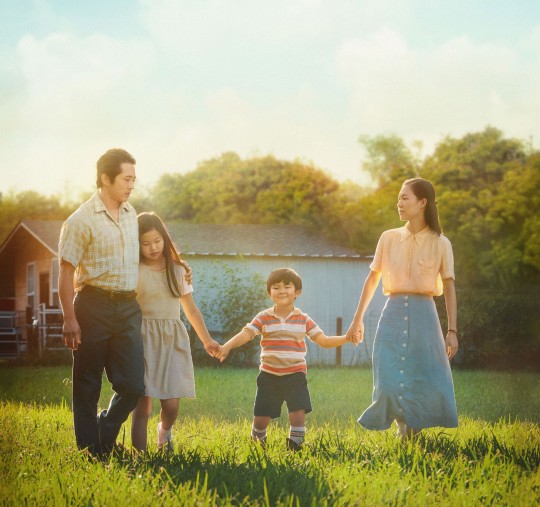
When you cease to admire and begin to remember
(Review of ‘Minari’ watched on iTunes on the 6th of March 2021)
South Korean films have been on everyone’s lips in recent years with films such as ‘Burning’ (2018) and ‘Parasite’ (2019) with the latter consolidating this movement with its triumph at last year’s Academy Awards. ‘Minari’ follows in the slipstream of this movement, although it is an American produced film set in America. But while the widespread and more mainstream success of ‘Burning’ and ‘Parasite’ hopefully will make more viewers open to watch ‘Minari’, it must be made clear that ‘Minari’ is completely its own and something very different. You do not have the mystery of Lee’s 2018 film or the pace and wit of Bong’s 2019 film here, as we follow the Yi family as they - and in particular its patriarch Jacob - dreams the American Dream of making it in God’s own country. ‘Minari’ is in no way the first film to tell a story of the American Dream and in no way will it be the last. It stands out, however, as one of the most honest, heartfelt and subtle portrayals of the Dream and the toll it takes on those trying to obtain it.
The Yi family consisting of father Jacob, mother Monica, daughter Anne and son David is the typical nuclear family. They have been in America for some time living a decent yet unsatisfying life in California where Jacob has gained a reputation of a masterful chicken sexer. However, he - as most immigrants arriving in America - yearns to make it on his own. You do not come to America to work for others, it is to be understood. You come to America to prove yourself, to make your own business and to secure you and your family’s fortune. Jacob purchases a large piece of land in Arkansas so he can build his own farm and become independent from sorting male chickens in to blue boxes and female chickens into white boxes. What follows is a subtle, heartfelt, personal and deeply moving “slice of life” as we follow the ups and downs for the farm as well as the family and its individual members.
Steven Yeun, who also starred in aforementioned ‘Burning’ and is a rising star in America, is at the centre of the story as the determined father, Jacob, who spends day in and day out in the fields trying to build a succesful farm. He is clearly inspired by the American Dream and the American way of life, but he is also evidently proud of his Korean roots. This is seen when he initially discards the superstitious American way of finding the perfect spot for a well with a calm remark to David that “we Koreans use our minds” followed by a triumphant scream as the two of them find a water source. Yeun gives a nuanced performance as Jacob delivering his subtle yearning moments just as powerful as his frustrations when his dream takes a toll on his family and his desire to make it pushes him further and further away from his family, his roots and his initial dreams. His chemistry with Yeri Han as Monica is very natural and you are never in doubt of neither their love for each other or the fact that his love is constantly threatened by the overpowering dream of making it big. In a particularly touching scene, Jacob asks Monica, “Remember what we said when we got married? That we'd move to America and save each other?”. The two actors infuses this scene with such a reality and personality.
Opposite of Yeun and Han, Noel Cho as Anne and in particular Alan S. Kim as David are equally impressive as the youngest members of the family. Especially David becomes the films emotional core being a child of immigration. He mainly speaks in English, drinks Mountain Dew and has some very clear opinions on life in Korea and Korean things in general despite having never lived there yet alone visited it. All of this becomes clearer and more evident as the children’s grandmother, Soonja, arrives to finally live with the family after many years. She comes the long way from Korea, has never met David and as such it is in their meeting and growing relationship we experience the gap between the family’s roots and new existence. A touching, inspiring and importantly sober portrayal of immigration. As Soonja, 73-year old Yuh-jung Youn is the film’s true miracle. She is in no way a “real grandma” in David’s americanised eyes; she does not bake cookies, she swears and she walks around in mens’ underwear. However, Soonja quickly sheds new light on every aspect of the Yi family’s American existence. She finds a perfect spot near a distant creek that the family has up until now neglected because of the snakes living there. A perfect spot for growing the titular vegetable minari, which according to Soonja can be used in food and medicine alike and by both beggars and rich people; it grows anywhere. Youn is a marvel as Soonja breathing so much life, love and experience into the film’s dynamics - giving some minari not only to the family but us as viewers as well.
The acting knocks it out of the park with its five main actors as well as small but memorable supporting roles from the likes of Esther Moon and Will Patton. The technical aspects of the film are not to be overlooked, though. The dreamy score by Emile Mosseri beautifully compliments the naturalistic cinematography by Lachlan Milne. We see and understand the beauty that Jacob sees in the green fields, the calm lushness that Soonja finds by the creek and the unsatisfying, sombre reality of the chicken sexing industry. These are worlds that many people don’t know or see, but through the lens of Milne, the sound of Mosseri, the vision of director Chung and the acting of Yeun, Youn, and co. we get an appreciation of these worlds. An appreciation of the life, the struggles and the consequences of leaving your roots to seek purpose, richness and success in the light of the ever present American Dream. In a world where immigration, dreaming and cultural roots are under constant pressure this film is a little gem in the dark, dry dirt of reality.
Undoubtedly, Minari is a film that will bore some people. It is slow-moving, stripped of any major dramatical twists and turns and its realistic duo lingual dialogue switching between English and Korean will put some viewers off. Those who can look beyond this, however, are given a passionate, touching story that feels equally universal and personal. Because, make no mistake, this film could never have been as engaging or touching as it is had it not been for director and writer Lee Isaac Chung. He - the son of Korean immigrants in Arkansas himself - pours personal passion, love and memories into his beautiful script and visionary directing. Having said that the story of ‘Minari’ came to him as he “ceased to admire and began to remember”, the film on its own becomes a symbol of the importance of remembering and allowing your roots to shine through if you are to truly and wholeheartedly make it. With this in mind, ‘Minari’ easily comes to stand as one of the most personal stories to come out of American cinema in recent years.
4,5/5
#Movie Review#Film Review#Oscars Warm Up#Oscars 2021#Minari#Steven Yeun#Yeri Han#Noel Cho#Alan S Kim#Yuh-Jung Youn#esther Moon#Will Patton#Emile Mosseri#Lachlan Milne#Lee Isaac Chung
3 notes
·
View notes